#who are all largely wealthy elite
Explore tagged Tumblr posts
Text
Every time I get an advertisement for MCU nonsense I remember why I rarely enjoy adaptations.
#blackbird.txt#anti mcu#heard the castle/vania show did a great job with annette#and the concept for her seems so cool#her design is gorgeous as well#but the show used ‘cabal’ to refer to the society of vampires trying to take over the world#who are all largely wealthy elite#and that was in the advertisements!#so uh… no.#the spider-verse panther and beetle adaptations were all stellar#and reminded me what good adaptations were#but alas.#they are few and far between.
0 notes
Text
The true, tactical significance of Project 2025
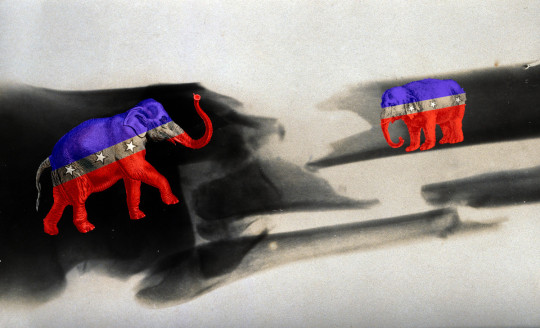
TODAY (July 14), I'm giving the closing keynote for the fifteenth HACKERS ON PLANET EARTH, in QUEENS, NY. Happy Bastille Day! NEXT SATURDAY (July 20), I'm appearing in CHICAGO at Exile in Bookville.

Like you, I have heard a lot about Project 2025, the Heritage Foundation's roadmap for the actions that Trump should take if he wins the presidency. Given the Heritage Foundation's centrality to the American authoritarian project, it's about as awful and frightening as you might expect:
https://www.project2025.org/
But (nearly) all the reporting and commentary on Project 2025 badly misses the point. I've only read a single writer who immediately grasped the true significance of Project 2025: The American Prospect's Rick Perlstein, which is unsurprising, given Perlstein's stature as one of the left's most important historians of right wing movements:
https://prospect.org/politics/2024-07-10-project-2025-republican-presidencies-tradition/
As Perlstein points out, Project 2025 isn't new. The Heritage Foundation and its allies have prepared documents like this, with many identical policy prescriptions, in the run-up to many presidential elections. Perlstein argues that Warren G Harding's 1921 inaugural address captures much of its spirit, as did the Nixon campaign's 1973 vow to "move the country so far to the right 'you won’t even recognize it.'"
The threats to democracy and its institutions aren't new. The right has been bent on their destruction for more than a century. As Perlstein says, the point of taking note of this isn't to minimize the danger, rather, it's to contextualize it. The American right has, since the founding of the Republic, been bent on creating a system of hereditary aristocrats, who govern without "interference" from democratic institutions, so that their power to extract wealth from First Nations, working people, and the land itself is checked only by rivalries with other aristocrats. The project of the right is grounded in a belief in Providence: that God's favor shines on His best creations and elevates them to wealth and power. Elite status is proof of merit, and merit is "that which leads to elite status."
When a wealthy person founds an intergenerational dynasty of wealth and power, this is merely a hereditary meritocracy: a bloodline infused with God's favor. Sometimes, this belief is dressed up in caliper-wielding pseudoscience, with the "good bloodline" reflecting superior genetics and not the favor of the Almighty. Of course, a true American aristocrat gussies up his "race realism" with mystical nonsense: "God favored me with superior genes." The corollary, of course, is that you are poor because God doesn't favor you, or because your genes are bad, or because God punished you with bad genes.
So we should be alarmed by the right's agenda. We should be alarmed at how much ground it has gained, and how the right has stolen elections and Supreme Court seats to enshrine antimajoritarianism as a seemingly permanent fact of life, giving extremist minorities the power to impose their will on the rest of us, dooming us to a roasting planet, forced births, racist immiseration, and most expensive, worst-performing health industry in the world.
But for all that the right has bombed so many of the roads to a prosperous, humane future, it's a huge mistake to think of the right as a stable, unified force, marching to victory after inevitable victory. The American right is a brittle coalition led by a handful of plutocrats who have convinced a large number of turkeys to vote for Christmas.
The right wing coalition needs to pander to forced-birth extremists, racist extremist, Christian Dominionist extremists (of several types), frothing anti-Communist cranks, vicious homophobes and transphobes, etc, etc. Pandering to all these groups isn't easy: for one thing, they often want opposite things – the post-Roe forced birth policies that followed the Dobbs decision are wildly unpopular among conservatives, with the exception of a clutch of totally unhinged maniacs that the party relies on as part of a much larger coalition. Even more unpopular are policies banning birth control, like the ones laid out in Project 2025. Less popular still: the proposed ban on no-fault divorce. Each of these policies have different constituencies to whom they are very popular, but when you put them together, you get Dan Savage's "Husbands you can't leave, pregnancies you can't prevent or terminate, politicians you can't vote out of office":
https://twitter.com/fakedansavage/status/1805680183065854083
The constituency for "husbands you can't leave, pregnancies you can't prevent or terminate, politicians you can't vote out of office" is very small. Almost no one in the GOP coalition is voting for all of this, they're voting for one or two of these things and holding their noses when it comes to the rest.
Take the "libertarian" wing of the GOP: its members do favor personal liberty…it's just that they favor low taxes for them more than personal liberty for you. The kind of lunatic who'd vote for a dead gopher if it would knock a quarter off his tax bill will happily allow his coalition partners to rape pregnant women with unnecessary transvaginal ultrasounds and force them to carry unwanted fetuses to term if that's the price he has to pay to save a nickel in taxes:
https://pluralistic.net/2021/09/29/jubilance/#tolerable-racism
And, of course, the religious maniacs who profess a total commitment to Biblical virtue but worship Trump, Gaetz, Limbaugh, Gingrich, Reagan, and the whole panoply of cheating, lying, kid-fiddling, dope-addled refugees from a Jack Chick tract know that these men never gave a shit about Jesus, the Apostles or the Ten Commandments – but they'll vote for 'em because it will get them school prayer, total abortion bans, and unregulated "home schooling" so they can brainwash a generation of Biblical literalists who think the Earth is 5,000 years old and that Jesus was white and super into rich people.
Time and again, the leaders of the conservative movement prove themselves capable of acts of breathtaking cruelty, and undoubtedly many of them are depraved sadists who genuinely enjoy the suffering of their enemies (think of Trump lickspittle Steven Miller's undisguised glee at the thought of parents who would never be reunited with children after being separated at the border). But it's a mistake to think that "the cruelty is the point." The point of the cruelty is to assemble and maintain the coalition. Cruelty is the tactic. Power is the point:
https://pluralistic.net/2022/03/09/turkeys-voting-for-christmas/#culture-wars
The right has assembled a lot of power. They did so by maintaining unity among people who have irreconcilable ethics and goals. Think of the pro-genocide coalition that includes far-right Jewish ethno-nationalists, antisemitic apocalyptic Christians who believe they are hastening the end-times, and Islamophobes of every description, from War On Terror relics to Hindu nationalists.
This is quite an improbable coalition, and while I deplore its goals, I can't help but be impressed by its cohesion. Can you imagine the kind of behind-the-scenes work it takes to get antisemites who think Jews secretly control the world to lobby with Zionists? Or to get Zionists to work alongside of Holocaust-denying pencilneck Hitler wannabes whose biggest regret is not bringing their armbands to Charlottesville?
Which brings me back to Project 2025 and its true significance. As Perlstein writes, Project 2025 is a mess. Clocking in an 900 pages, large sections of Project 2025 flatly contradict each other, while other sections contain subtle contradictions that you wouldn't notice unless you were schooled in the specialized argot of the far right's jargon and history.
For example, Project 2025 calls for defunding government agencies and repurposing the same agencies to carry out various spectacular atrocities. Both actions are deplorable, but they're also mutually exclusive. Project 2025 demands four different, completely irreconcilable versions of US trade policy. But at least that's better than Project 2025's chapter on monetary policy, which simply lays out every right wing theory of money and then throws up its hands and recommends none of them.
Perlstein says that these conflicts, blank spots and contradictions are the most important parts of Project 2025. They are the fracture lines in the coalition: the conflicting ideas that have enough support that neither side can triumph over the other. These are the conflicts that are so central to the priorities of blocs that are so important to the coalition that they must be included, even though that inclusion constitutes a blinking "LOOK AT ME" sign telling us where the right is ready to split apart.
The right is really good at this. Perlstein points to Nixon's expansion of affirmative action, undertaken to sow division between Black and white workers. We need to get better at it.
So far, we've lavished attention on the clearest and most emphatic proposals in Project 2025 – for understandable reasons. These are the things they say they want to do. It would be reckless to ignore them. But they've been saying things like this for a century. These demands constitute a compelling argument for fighting them as a matter of urgency, with the intention of winning. And to win, we need to split apart their coalition.
Perlstein calls on us to dissect Project 2025, to cleave it at its joints. To do so, he says we need to understand its antecedents, like Nixon's "Malek Manual," a roadmap for destroying the lives of civil servants who failed to show sufficient loyalty to Nixon. For example, the Malek Manual lays out a "Traveling Salesman Technique" whereby a government employee would be given duties "criss-crossing him across the country to towns (hopefully with the worst accommodations possible) of a population of 20,000 or under. Until his wife threatens him with divorce unless he quits, you have him out of town and out of the way":
https://www.google.com/books/edition/Final_Report_on_Violations_and_Abuses_of/0dRLO9vzQF0C?hl=en&gbpv=1&dq=%22organization+of+a+political+personnel+office+and+program%22&pg=PA161&printsec=frontcover
It's no coincidence that leftist historians of the right are getting a lot of attention. Trumpism didn't come out of nowhere – Trump is way too stupid and undisciplined to be a cause – he's an effect. In his excellent, bestselling new history of the right in the early 1990s, When the Clock Broke, Josh Ganz shows us the swamp that bred Trump, with such main characters as the fascist eugenicist Sam Francis:
https://us.macmillan.com/books/9780374605445/whentheclockbroke
Ganz joins the likes of the Know Your Enemy podcast, an indispensable history of reactionary movements that does excellent work in tracing the fracture lines in the right coalition:
https://www.patreon.com/posts/when-clock-broke-106803105
Progressives are also an uneasy coalition that is easily splintered. As Naomi Klein argues in her essential Doppelganger, the liberal-left coalition is inherently unstable and contains the seeds of its own destruction:
https://pluralistic.net/2023/09/05/not-that-naomi/#if-the-naomi-be-klein-youre-doing-just-fine
Liberals have been the senior partner in that coalition, and their commitment to preserving institutions for their own sake (rather than because of what they can do to advance human thriving) has produced generations of weak and ineffectual responses to the crises of terminal-stage capitalism, like the idea that student-debt cancellation should be means-tested:
https://pluralistic.net/2022/05/03/utopia-of-rules/#in-triplicate
The last bid for an American aristocracy was repelled by rejecting institutions, not preserving them. When the Supreme Court thwarted the New Deal, FDR announced his intention to pack the court, and then began the process of doing so (which included no-holds-barred attacks on foot-draggers in his own party). Not for nothing, this is more-or-less what Lincoln did when SCOTUS blocked Reconstruction:
https://pluralistic.net/2020/09/20/judicial-equilibria/#pack-the-court
But the liberals who lead the progressive movement dismiss packing the court as unserious and impractical – notwithstanding the fact that they have no plan for rescuing America from the bribe-taking extremists, the credibly accused rapist, and the three who stole their robes. Ultimately, liberals defend SCOTUS because it is the Supreme Court. I defended SCOTUS, too – while it was still a vestigial organ of the rights revolution, which improved the lives of millions of Americans. Human rights are worth defending, SCOTUS isn't. If SCOTUS gets in the way of human rights, then screw SCOTUS. Sideline it. Pack it. Make it a joke.
Fuck it.
This isn't to argue for left seccession from the progressive coalition. As we just saw in France, splitting at this moment is an invitation to literal fascist takeover:
https://jacobin.com/2024/07/melenchon-macron-france-left-winner
But if there's one thing that the rise of Trumpism has proven, it's that parties are not immune to being wrestled away from their establishment leaderships by radical groups:
https://pluralistic.net/2023/06/16/that-boy-aint-right/#dinos-rinos-and-dunnos
What's more, there's a much stronger natural coalition that the left can mobilize: workers. Being a worker – that is, paying your bills from wages, instead of profits – isn't an ideology you can change, it's a fact. A Christian nationalist can change their beliefs and then they will no longer be a Christian nationalist. But no matter what a worker believes, they are still a worker – they still have a irreconcilable conflict with people whose money comes from profits, speculation, or rents. There is no objectively fair way to divide the profits a worker's labor generates – your boss will always pay you as little of that surplus as he can. The more wages you take home, the less profit there is for your boss, the fewer dividends there are for his shareholders, and the less there is to pay to rentiers:
https://pluralistic.net/2024/04/19/make-them-afraid/#fear-is-their-mind-killer
Reviving the role of workers in their unions, and of unions in the Democratic party, is the key to building the in-party power we need to drag the party to real solutions – strong antimonopoly action, urgent climate action, protections for gender, racial and sexual minorities, and decent housing, education and health care.
The alternative to a worker-led Democratic Party is a Democratic Party run by its elites, whose dictates and policies are inescapably illegitimate. As Hamilton Nolan writes, the completely reasonable (and extremely urgent) discussion about Biden's capacity to defeat Trump has been derailed by the Democrats' undemocratic structure. Ultimately, the decision to have an open convention or to double down on a candidate whose campaign has been marred by significant deficits is down to a clutch of party officials who operate without any formal limits or authority:
https://www.hamiltonnolan.com/p/the-hole-at-the-heart-of-the-democratic
Jettisoning Biden because George Clooney (or Nancy Pelosi) told us to is never going to feel legitimate to his supporters in the party. But if the movement for an open convention came from grassroots-dominated unions who themselves dominated the party – as was the case, until the Reagan revolution – then there'd be a sense that the party had constituents, and it was acting on its behalf.
Reviving the labor movement after 40 years of Reaganomic war on workers may sound like a tall order, but we are living through a labor renaissance, and the long-banked embers of labor radicalism are reigniting. What's more, repelling fascism is what workers' movements do. The business community will always sell you out to the Nazis in exchange for low taxes, cheap labor and loose regulation.
But workers, organized around their class interests, stand strong. Last week, we lost one of labor's brightest flames. Jane McAlevey, a virtuoso labor organizer and trainer of labor organizers, died of cancer at 57:
https://jacobin.com/2024/07/jane-mcalevey-strategy-organizing-obituary
McAlevey fought to win. She was skeptical of platitudes like "speaking truth to power," always demanding an explanation for how the speech would become action. In her classic book A Collective Bargain, she describes how she built worker power:
https://pluralistic.net/2023/04/23/a-collective-bargain/
McAlevey helped organize a string of successful strikes, including the 2019 LA teachers' strike. Her method was straightforward: all you have to do to win a strike or a union drive is figure out how to convince every single worker in the shop to back the union. That's all.
Of course, it's harder than it sounds. All the problems that plague every coalition – especially the progressive liberal/left coalition – are present on the shop floor. Some workers don't like each other. Some don't see their interests aligned with others. Some are ornery. Some are convinced that victory is impossible.
McAlevey laid out a program for organizing that involved figuring out how to reach every single worker, to converse with them, listen to them, understand them, and win them over. I've never read or heard anyone speak more clearly, practically and inspirationally about coalition building.
Biden was never my candidate. I supported three other candidates ahead of him in 2020. When he got into office and started doing a small number of things I really liked, it didn't make me like him. I knew who he was: the Senator from MBNA, whose long political career was full of bills, votes and speeches that proved that while we might have some common goals, we didn't want the same America or the same world.
My interest in Biden over the past four years has had two areas of focus: how can I get him to do more of the things that will make us all better off, and do less of the things that make the world worse. When I think about the next four years, I'm thinking about the same things. A Trump presidency will contain far more bad things and far fewer good ones.
Many people I like and trust have pointed out that they don't like Biden and think he will be a bad president, but they think Trump will be much worse. To limit Biden's harms, leftists have to take over the Democratic Party and the progressive movement, so that he's hemmed in by his power base. To limit Trump's harms, leftists have to identify the fracture lines in the right coalition and drive deep wedges into them, shattering his power base.

Support me this summer on the Clarion Write-A-Thon and help raise money for the Clarion Science Fiction and Fantasy Writers' Workshop!

If you'd like an essay-formatted version of this post to read or share, here's a link to it on pluralistic.net, my surveillance-free, ad-free, tracker-free blog:
https://pluralistic.net/2024/07/14/fracture-lines/#disassembly-manual
#pluralistic#politics#project 2025#heritage foundation#history#jane macalevey#rip#tactics#republicans in disarray#turkeys voting for christmas#rick perlstein#know your enemy#fracture lines#when the clock broke#john ganz#hamilton nolan
2K notes
·
View notes
Text
Wick Sable
The odd duck in the guilded cage
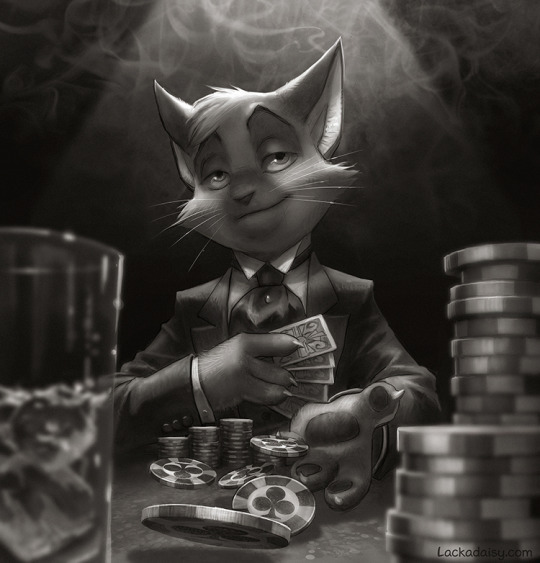
Despite this being a feral Mordecai and Viktor account I do occasionally like to dig into the others.
Wick is a character Lackadaisy fans love but don't talk about very much. He just the rich friendly geologist with a love of illicit beverages and a crush on Mitzi. Indeed he is all those things. But I want to dig a little into what may be hidden depth (geography joke haha)
Professional dissatisfaction
When we first meet Wick he is behind his desk looking very tired and beaten down. Forcing himself to keep working late into the night with excessive coffee. Attending to a large pile of paper work for tomorrow.
His expression shifts slightly when he sees the Lackadaisy pins fall out of the envelope and realises the letter is an invitation to him (and his fellow aristocrats) to the speakeasy.

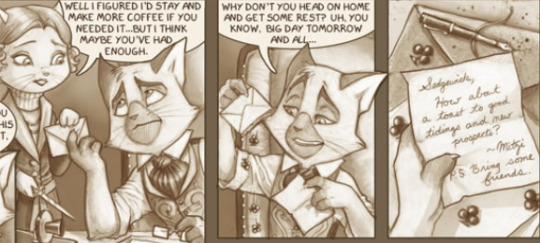
This hatred of paper work and the administrative side of his business is a recurring issue for Wick. Making the reason for his reliance on the capable and attentive Lacy very obvious. Exhaustian and too much alchohol are no doubt partly to blame, but it seems to be something that puts him in a very depressed state of mind.
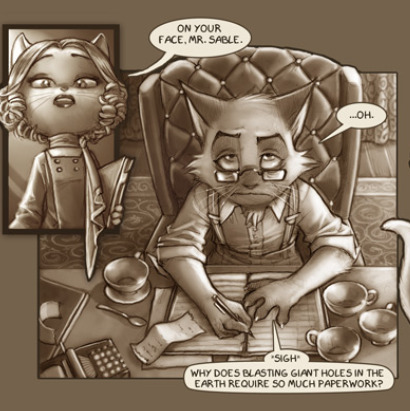

But when actually on the job, overseeing the hands on work of blasting a new quarry, his mood is much more positive. Indeed he has a very real and sincere love for geology and the nitty gritty work of his business. When he first went to the Lackadaisy he was spellbound by the lime caverns themselves as much by Mitzi's charm.
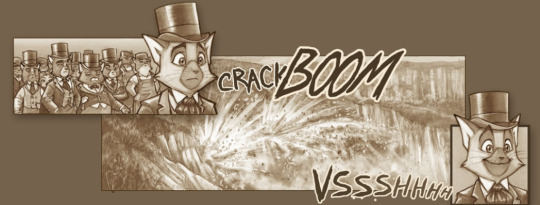
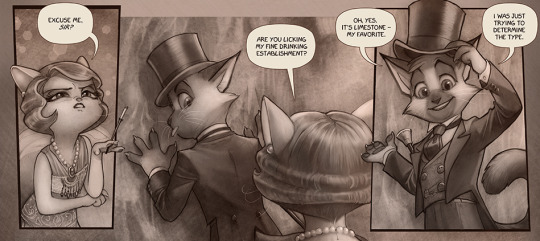
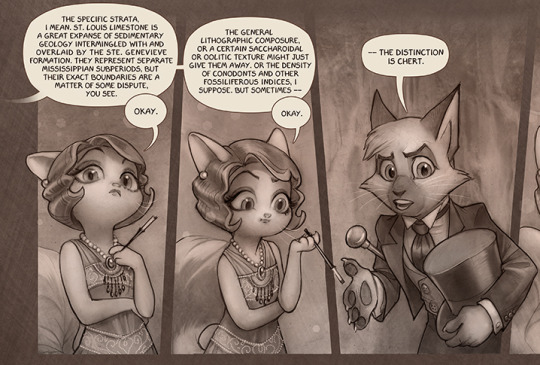
Its his special interest and he will go on long unprompted monologues on the topic if given the chance. Meaning it is specifically the being trapped in his office dealing with the red tape that makes him so unhappy not the industry itself.
Its almost sad that he is the one in charge of the company rather than in a role that puts him closer to the action which seems to bring him real joy. Like someone who loves cooking being in charge of a restuarant or someone that loves drawing running an animation studio.
They love the product/industry but that doesn't mean they enjoy their specific place in it.
Unimpressed Peers
Despite Wicks enthusiasm it proves not be infectious with his fellow elite, who complain about being dragged out of town to watch something, that while very important to Wick, they clearly could not care less about (even not that quietly mocking him and his love for rocks and construction)
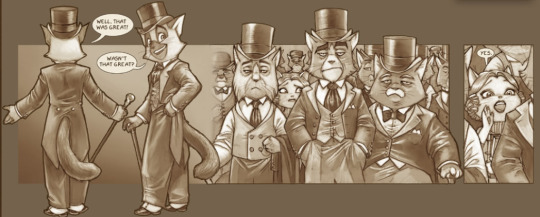

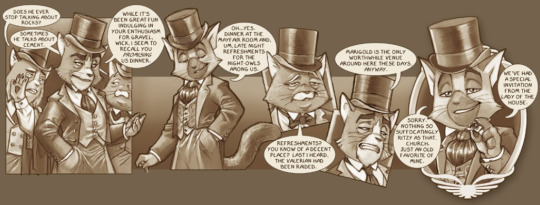
When the evening doesn't go to plan due to the uninvited pig farmers Wick has an interesting exchange with Edmund Church, seemingly the most prominent of the St Louis upper crust in the group. Warning him about getting any more involved with an unsavoury crowd, especially Mitzi, outside of simply enjoying the occasional drink.
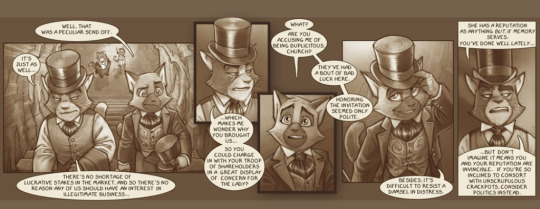
Wick doesn't take kindly to the snarky criticism and borderline threat to his reputation and responds with a much more direct statement on his peers sour nature
Tracy has mentioned that Church has a role yet to play in the story and it seems safe to assume from this it may well involve Wick in a less than friendly way if he continues to associate with his "lessers" as Church and the others see things.
Despite needing to remain on civil terms to keep them invested in his business, Wick clearly has little love for them, a feeling that is mutual as they have little respect for him and see him as an oddball, only tolerating him because his talent in his field can help make them a tidy profit.
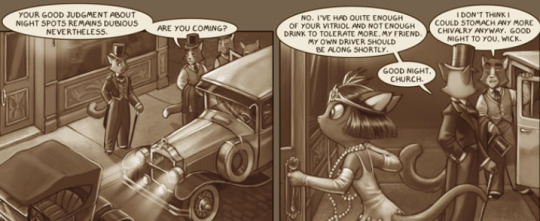
But while he doesn't appreciate Church's sniping Wick IS concerned about his reputation, but not entirely for his own sake or that of his elitist associates, but for the many people who rely on him for employment, who could be hurt by extension of he gets pulled too deep into the less than repectable world of bootlegging
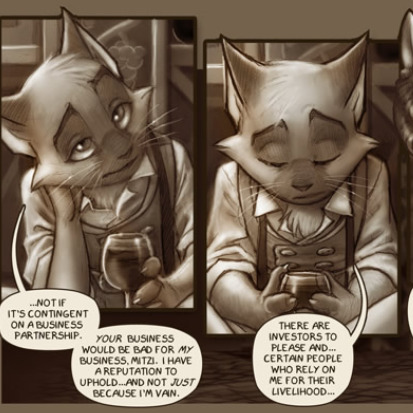
Romantic life
Outside of the crush he has had on Mitzi since first meeting her at the Speakeasy, we have very little information about Wicks love life before this. Being a handsome and wealthy gentleman from a good family, you would think he would he fighting women off with a stick, maybe even be a bit of a playboy.
Instead you get the impression Wick is pretty far away from being a ladies man. Mentioning to Mitzi that he doesn't even really know how to talk to women unless its about rocks, bugs or limestone.

He is clearly attracted to her and is tempted by her to risk his reputation and by extension his business to get closer to her, but so far his fear of the very real consequences are deterring him from taking that gamble.
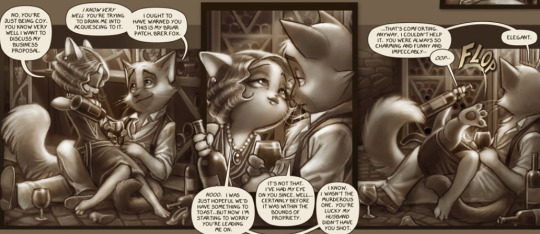
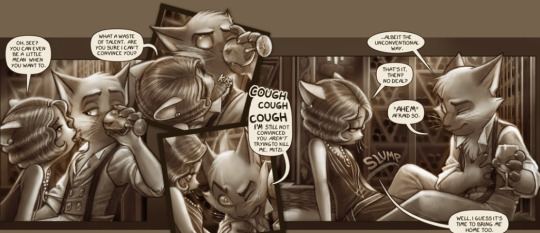
Though there is that personal aspect to it, it seems that in a more abstract sense Mitzi's appeal to Wick is not just in her beauty and seductive personality, but in the excitement and thrill of her Speakeasy and bootlegging operations.
In that sense Mitzi represents that touch of danger and excitement that during prohibition many otherwise law abiding citizens enjoyed indulging in illegal drinking establishments. Being* just* naughty enough to give them a fun thrill while being detached from the more brutal blood soaked aspects.
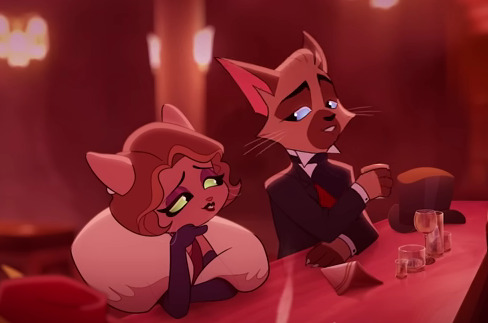
Wick is a good natured person (the worst thing he has done is shoot a duck in his youth which he was forced to do) living a very "respectable" life, but that makes the superficial glamour of the world of underground drinking establishments and secret booze stashes even more appealing. Thats why despite his concerns and responsibilities he keeps going back ,not just to Mitzi, but to the Lackadaisy specifically. It has pretty geography, a pretty owner, and an open door to a more exciting avenue of life
Its for that same reason he doesn't seem to be overly uncomfortable with lovable bi disaster Zib flirting with him at the bar. He may have no intention of reciprocating, but it couldn't be a more different experience to the world he is used to
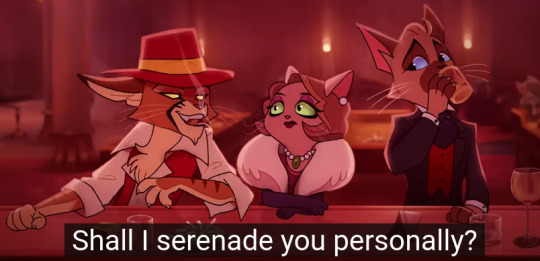
Even if he doesn't yet want to take the full plunge it all excites him enough to keep him circling the edges.
Because despite having so much going for him there are things about his life that not only bore him but make him unhappy. Whether its piles of paperwork, dealing with much stuffier "conventional" fellow aristocrats and not wanting to be like them, or just a general lack of true passion in his life, he is clearly a man looking for something more satisfying
Whether or not he remains a "tourist" or decides to take that gamble, throw his reservations to the wind, and take a more active role in the gang, is yet to be seen...

Assuming Rocky doesn't set fire to him first of course XD
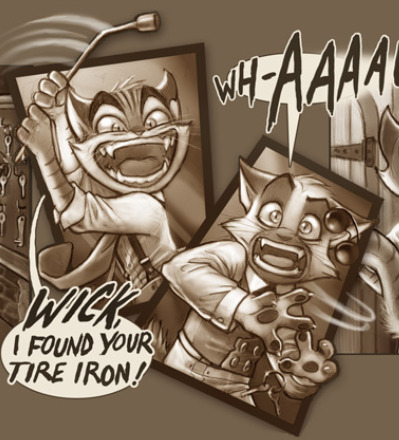
#lackadaisy#tracy j butler#lackadaisycats#wick sable#mitzi may#lacy hardt#zib#dorian zibowski#wick x mitzi#zibwick#zib x wick#long post#comic#pilot#sedgewick sable#edmund church#cats#gangsters#1920s#prohibition
2K notes
·
View notes
Text
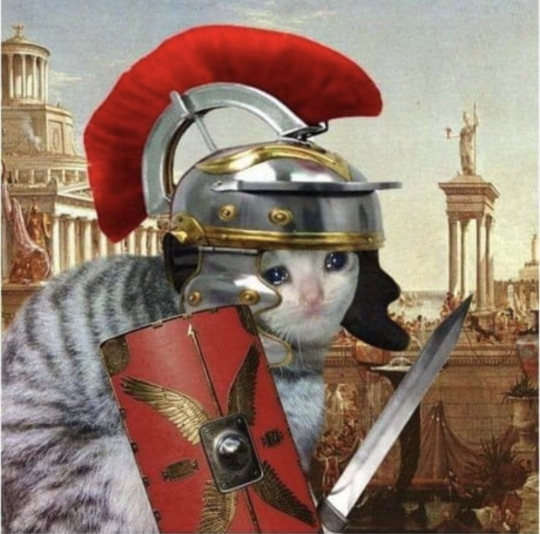
The Sad Fate of Roman War Veterans and How the Punic Wars Destroyed the Roman Middle Class
There's no question that Rome's victory over Carthage during the Punic Wars drastically changed the Roman Republic. Perhaps the most apparent change was Rome's ascendancy from a smaller power in Italy to the dominant power in the Mediterranean. In other words, a big fish in a small pond, to a big fish in a literal big pond. In the span of 120 years Roman territory expanded by vast amounts followed by further Roman expansionism resulting in Roman territory stretching from Spain and North Africa in the west to Greece and Anatolia in the east.


While the Punic Wars would transform Rome into an (e)mpire militarily, it also transformed Roman socio-economic structures. The early Roman Republic had no standing professional armies. Instead to wage war Rome used a militia system with citizen soldiers who were called up as needed. Since the state had no role in equipping soldiers, it was up to soldiers to equip themselves. Roman lower classes were exempt from military service since they could not afford weapons, armor, or supplies while the Roman upper class served as officers or elite cavalrymen. Thus, the responsibility for providing the rank and file infantry of the army fell to the Roman middle class. The Roman middle class consisted of some skilled artisans and small business owners, but by far most of the Roman middle class were farmers who owned small plots of land.
Up until the Punic Wars, this system worked fine as war was a small, short, local event that occurred within the confines of central and southern Italy. A Roman soldier didn't have far to travel from home as the enemy was within easy marching distance away. War was also a seasonal affair where the fighting occurred on the off season, then a truce was called so that soldiers could tend their farms during the growing season, with the war resuming once the crops were harvested. Now Roman soldiers were expected to be shipped to far off places such as Africa, Spain, Greece, Macedonia, and Anatolia. Whereas before wars were short seasonal affairs, now wars seemed to last forever with no recesses so that soldiers can tend their farms. Both the first and second Punic Wars nearly lasted two decades each. And war was everywhere as the Punic Wars involved multiple fronts all over the Mediterranean. No longer were Roman wars short, small, localized affairs. In the meantime while soldiers were away fighting, their fields were fallow and their businesses had fallen into disrepair. The Republic tried to mitigate the financial strains of the Punic Wars on its soldiers by paying a stipend. However it was not enough to prevent financial disaster. When the war ended and Rome's veterans returned home in triumph, they were broke and impoverished.
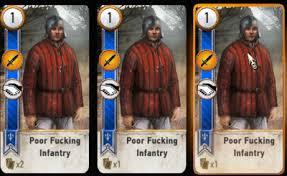
In order to make ends meet or pay off debt, most had to sell off their land to wealthy landholders, who consolidated that land into large estates and plantations. Many who sold their land became tenant farmers on the land that they had previously owned. Others moved to the city and tried to eek out a living as a laborer, however the price of labor was plummeting as Rome had taken tens of thousands of slaves during the Punic Wars and were taking tens of thousands more in various wars across the Mediterranean. War veterans found that there was no place for them in Roman society. Their farms and businesses were gone, and there was no need for their labor due to the sudden influx of slaves. Wealthy Roman elites had taken control of most of the Republic's land and wealth while a large percentage of the middle class were booted into poverty.
The result of everything I have previously described was a massive and ever growing rift between the rich and the poor as wealth became more and more concentrated at the top. This event became a hot button issue in Roman politics with Roman government being dominated between two unofficial political parties; the optimates, or those who supported the interests of the Roman elite, and the populares, or those who supported the interests of the common Roman. The clash between the optimates and populares led to increasing political instability resulting in the rise of demagogues and dictators. Civil war became common, and eventually the Roman Republic fell, giving rise to the Roman Empire.
youtube
300 notes
·
View notes
Text
the basics of tevinter politics and social classes, as laid out in world of thedas and a little elsewhere
the archon is the supreme ruler of the imperium. their authority and magical power is believed to be divinely granted. they choose their successors before they die, so they are usually the sons, nephews, brothers, cousins, or apprentices of previous archons. (this phrasing implies that, like the black divine, the archon is always a man, and certainly the several named ones we know all are, but i’m not sure if this is necessarily always true.) if an archon does not choose his heir before he dies, the magisterium elects the next; these candidates cannot be magisters or hold rank in the chantry. technically the archon can overrule the laws passed by the magisterium, but he rarely does this. his power mostly stems from families vying for his favour, as he has the unique power to appoint magisters at will. a man named radonis is the current archon; he’s appeared in comics and a war table mission.
the magisterium are the mage elites who regularly gather to govern the imperium and pass laws. magisters become magisters in several ways:
one is chosen from each of tevinter’s seven circles of magi. it cannot be that circle’s first enchanter
the imperial divine and every grand cleric of the imperial chantry gets a seat
magisters can inherit seats
as i mentioned, the archon has the right to appoint any new magister if he chooses
tevinter society breaks down into four major social classes.
the first mage class is the altus class. these are descended from the original “Dreamers”, through ancient and wealthy magical bloodlines. most magisters come from altus families. characters like dorian and danarius belong to this class.
other mages belong to the laetan class. these are mages who cannot trace their ancestry to the dreamers, and may belong to families with no history of magic at all. many vie for power despite their origins, and one third of the imperium’s archons have been laetans. (the first laetan to rise to archon was such an outrage it caused a seventy year civil war, but that was, like, 1500 years ago-ish. they’re more chill about it now.) it feels safe to assume that neve gallus, who says in tevinter nights that she doesn’t feel at home in a wealthy estate because she has more templars in her family than mages, probably belongs to this class.
the soporati are non-mages who are still full tevinter citizens. they are allowed to own property and serve in the military, but they cannot have a direct say in government or rise above the rank of mother/father in the chantry. they can however be civil servants and merchants. a mage born to a soporati family is instantly a laetan.
slaves are not allowed to own property, or to hold military rank even when armed and serving as a personal soldier or bodyguard. they have become a more even mix of humans and elves since andraste’s time. mages can be slaves. if a slave is set free, either by their living owner before a judge or by their owner’s will upon their death, they are considered liberati. liberati are still not citizens and cannot have political say or hold military rank, but they can join a circle of magi, get an apprenticeship in a trade, take apprentices themselves, and own property. fenris was a slave, while his sister varania was implied to have become one of the liberati.
there is also a large surface dwarf population in tevinter. they are not considered citizens, but instead regarded as foreign dignitaries however many generations their families have lived in tevinter. they have large embassies in every major tevinter city, which at least in minrathous, neromenian, and qarinus are completely subterranean, meaning residents can retain their dwarven caste and may never come above ground all their lives. minrathous’ close ties to the dwarves mean it even has a massive proving grounds, as well as enormous stone golems known as juggernauts to guard the city gates. more than anywhere else in thedas, the dwarves do get a political say, with an elected body of representatives called the ambassadoria who advise the archon and the magisterium. it’s the imperium’s reliance on lyrium which gives them this kind of sway.
376 notes
·
View notes
Note
How do the people of the lower classes live in wardin? Is It different in each region? How dynamic is the social ladder? Does slavery exist?
Gonna just go through the whole social structure to answer this thoroughly
(little note for this post- when I say 'urban' and 'rural' it doesn't have the same meaning as the contemporary- urban Wardi spaces are the major cities and towns INCLUDING the massive areas of farmland that surround and them. Rural spaces are lands distant from major cities, wherein most people live in small and isolated villages sustained by herding or small-scale farming and are surrounded by grassland or scrub)
SOCIAL HIERARCHY:
The majority of cheap labor is maintained by high levels of class stratification in a fairly strict and well defined social structure. This hierarchy can be roughly divided into 3 main classes- royalty, nobility, and commoners.
---
Royalty consists of the Usoma and immediate kin, functionally the Usoma, the Usoma-Hittibe, the Usoma's wife, and his male heir. The rest of the royal family will be married into nobility and be functionally a part of that class (though tend to be appointed to high ranking roles in provincial government or the imperial court).
---
The noble class is broader and describes all landowners, who occupy a variety of roles. They staff the imperial court, form the majority of provincial officials, and many of the most Major priesthoods take their members (or at least high priests) from noble families. They own most of the land and livestock that urban agricultural laborers work, and are expected to distribute much of their take of agricultural goods to their provincial government. This status is hereditary and only lost in cases of individual disowning or Extremely profound familial disgrace (usually severe criminal behavior) that leads them to be stripped of their title and their lands seized.
There's three main variants of the nobility class
Old nobility: families with very longstanding status and land holdings, long predating Imperial Wardin as an entity and often derived from older chiefdoms and/or descended from the royalty or politicians of its previous kingdoms + city-states). These typically own the most land and have the most political power, but this is not universal. New nobility/'new money': an emergent class that rose in tandem with a wealthy mercantile class, largely in the past two centuries. These primarily derive from very wealthy mercantile families that secured political/trade power during the chaotic formation of Imperial Wardin. Most 'new money' families are actually at least a century old and TRULY New 'new money' status is rare. They are likely to have less landholdings but may have the same or greater political power (and sometimes material wealth) than old nobility. 'landed commoners' or 'lesser nobility': This isn't Really a subclass of nobility in practice, but have similar status and privileges in theory. These are people/families who have been bestowed minor titles and granted land ownership, while generally lacking the hard power of others in this class group. Most lesser nobility is comprised of priests or members of elite warrior orders, some other lay/civilian commoners may occasionally receive this grant as a reward or recognition. Very minimal hard power comes with this title, though it can enable a person to maneuver their family into a true position of 'nobility' with luck.
There are mild cultural distinctions between old nobility and new money nobility (as is typical when 'new money' status is differentiated). The most socially conservative old nobility families have avoided intermarriage with their new money counterparts and tend to conceptualize their status as an Innate quality rather than the circumstances of their birth, one that would be sullied by intermarriage with upjumped commoners (often accompanied by appeals to traditionalism and fond memories of a morally superior time that never actually existed). This is a minority however, and the two groups are largely intermingled and united by a sense that, regardless of ancestral origin, they're notably better than most other people.
---
The commoner class includes the VAST majority of the population. This class is very broad and includes a significant spectrum of wealth (some commoners are outright rich), but can be defined by lack of legal land ownership.
The majority of commoners (and majority of people in general) are agricultural laborers, and form a distinct subclass.
-Urban agriculturalists mostly work on land owned by nobility and used to sustain their city's population- the majority of their harvest is required to be given to their landowners, and a (smaller) majority of that is required to be distributed to the provincial government. They are allowed to live on their granted land and grow food for their own subsistence, but will have to buy or obtain their own animals for completely free use of livestock. -Rural agriculturalists are primarily living in villages away from any urban centers. Their land is not owned by nobility but not considered their own, being legally designated 'owned' by their province, and (in most cases) a percentage of their harvest is required to be paid to their province as tribute.
The other members of the lower commoner class are mainly fishers, sailors, trade caravaneers, and a variety of 'unskilled' laborers (contracted to build roads and buildings and general public works, etc).
---
The upper commoner class is varied and more difficult to place, and consists largely of people living Within the urban centers. These are mostly artisans and merchants, as well as a variety of lower status public officials, teachers/tutors/scholars, specialized agriculturalists, poets, bards, athletes, actors, etc.
Within many of the major cities, skilled artisans exist in selective mercantile guilds and can be economically secure or potentially even wealthy. These are potters, painters, sculptors, silver and goldsmiths, blacksmiths, weavers, saddlers, leatherworkers, shipbuilders, tailors, etc etc. The merchant owners of these guilds are typically fairly wealthy, and the most powerful guilds tend to be owned by established new money nobility. These guilds are most common and diversified in the major coastal provincial capitals and some of their towns (Ephennos, Wardin, and Erubinnos, some will say that Godsmouth is Run by its guilds) and a lesser/less diversified phenomena in interior or small coastal capitals (Jatsait, Erub, Lobera). Artisans may be commissioned by temples, nobility, or even royalty to produce their goods, and very successful artists can make a name and very good living for themselves.
Animal sacrifice is very important to religious practice- captive sacrificial stocks are owned by each priesthood and reserved for their internal or public rites, but the general public often desires to bring their own high value offerings and sacrificial stock vendors have emerged as a concept to meet this demand in urban contexts. These are a subset of merchants who purchase surplus livestock from nobility or agricultural laborers (or hunt or poach wild game) and resell it to the general public, priced by value and rarity. The vast majority deal in birds (cheap to acquire and good enough for common offerings), but some wealthier/craftier merchants trade in larger livestock or other highly valuable animals. A subset of sacrificial stock vendors are more opportunistic and deal in non-animal offerings, usually vending desirable flowers, grains, spices and oils utilized in common offerings and strategically setting themselves up near temples or en-route to festivals. This is practice is legal and not considered outright heretical in of itself, but is kind of the used car salesman of Wardi culture (ie: "this cow is DEFINITELY older than a year, clearly diseased, and has ABSOLUTELY been bred and yoked, I'm not paying you ten gulls ((coinage)) for this shit come on man") and they do not tend to be regarded all that positively.
--
There are a few other subclasses who do not neatly fit into the core class hierarchy:
Priesthood: This group consists of all official priests of the Faith. Their hard material social status can vary- a significant proportion are selected from nobility and retain other aspects of that status, but some are commoners. All enjoy a degree of social protection, esteemed status, and security.
Warrior class: This is not the same thing as being a soldier (all male citizens can be conscripted as footsoldiers), and is rather a high status warrior placed into an elite military order. Much of the warrior class is members of nobility, but this isn't Always pure nepotism and this status will often be given in recognition of prowess regardless of class origin. If a commoner, they are very often bestowed land titles and become lesser nobility.
Non-Imperial Wardi: These are groups within the claimed territories who are not a part of the cultural core, mostly ethnic minority groups (Hill Tribes, North Wardi, Cholemdinae, Wogan, and unassimilated remnants of other pre-Wardi tribes). These groups live within their own social structures (though many could be considered to fall under the 'rural agriculturalist' class group). Many are in a tributary relationship with their surrounding province, in which case they retain full self governance in return for giving a percentage of their yield to provincial officials. Some people living on claimed Imperial Wardi territory exist fully outside of the tributary structure (mainly areas that are difficult to access, very distant from city centers, and/or hostile to the production of mass-desirable crops or agriculture in general) and are entirely just doing their own damn thing.
SOCIAL MOBILITY:
As implied in all that, social mobility is very limited. The vast majority of people will occupy the same class position (same OCCUPATION at that) as their parents and grandparents and great grandparents and so on.
Intra-class mobility (ie from a field laborer to an artisan) is possible, but practical and cultural limitations discourage this. Your children inheriting the same labor as you is generally the most guaranteed method of security for yourself and your family. In the artisan and mercantile classes, passing your knowledge and trade from father to son is culturally typical, and taking up your father's position is somewhat a matter of familial piety (though outright IMPROVING your position to your family's benefit is better).
Servant positions actually offer some of the best intra-class mobility (and sometimes Full movements up the social ladder). A person from a very poor family can potentially find very well paid and secure labor in working for a noble family or priesthood. Servant positions to major priesthoods in general can have very good outcomes, potentially landing one a job as a high ranking attendant. The child servant-squires of Odonii may be initiated into the warrior class if they remain in the order as adults, which can be a VERY desirable outcome (if it occurs).
Initiation into a priesthood or the warrior class through any means is the other main method. The major priesthoods tend to select their members from nobility, but this is not ubiquitous (the Galenii are the biggest priesthood that will readily initiate across class lines). Initiation into the warrior class in recognition for prowess gives one high social status and will land one in the lesser nobility, in which you are bestowed land and a title. (This may not have all the hard power of true nobility, but it will generally set yourself and your family up for life).
The 'new money' nobility primarily stems from wealthy members of the mercantile class involved in the trade system, but most established themselves and secured their position a century ago and there's not a lot of remaining 'openings' for other merchants to achieve this. Most of the upper mercantile subclass will be economically secure but not landed or having the other status of noblemen.
Marriage into a noble family can occasionally be an avenue for mobility. The vast, VAST majority of marriages in noble families are arranged, and arranged with other noble families. Intra-class marriages will be functionally rare, but not non-existent- this will mostly be the daughters of the upper mercantile subclass being married to noblemen, but it will VERY occasionally be a "yeah fuck it, I'll let my dumbass sixth son marry that hot fisherman's daughter, who gives a shit" type situation.
SLAVERY:
Slavery is not a major part of the framework (as most cheap labor is provided via class stratification to maintain a massive, dependent lower agricultural class), but exists in the form of forced labor of enslaved prisoners (war captives and some condemned criminals) and indentured servitude.
Chattel slavery is not practiced here (beyond forms of illegal human trafficking, which is an Extant but not substantial phenomena), and enslaved prisoners are considered ‘owned’ by their province for the duration of their ‘sentence’. This force is mostly exploited for dangerous hard labor, especially mining and building products. Their enslavement is conceptualized as a form of punishment with a sentence of an explicit duration (ranging from months to years to life), so this status is not hereditary and Ostensibly not necessarily lifelong, but enslaved prisoners often endure grueling conditions and abuse with high mortality rates, and may experience tremendous barriers to the protections of citizenship or other forms of social security even if freed.
Indentured servitude is a form of slavery in which a person enters a legally enforced servant/labor position and is denied freedom of movement or ending their servitude for the duration of their contracts. Most indentured servants are forced into (or occasionally voluntarily enter) this position to pay off debts. Legally, indentured servitude can only be enforced during the duration of their contract (either the length to pay off a debt or an allotted time span) and the contract owner is required to provide for their basic needs, but abuses obviously occur.
This is separate from what I just refer to as servants, who are free commoners in paid positions with enforceable legal rights to end their servitude at any time (with pay cuts or similar consequences if this breaks a contract). These people occupy a broad spectrum of positions from cheaply paid labor to very well paid, even high status positions serving nobility, priesthoods, and royalty. As mentioned, these positions very occasionally offer class mobility, more commonly offer a good chance of ensuring lasting security for oneself and one's family (without class mobility), and in most cases it's just work that puts food on the table.
The exception to the freedom of servants is in the case of child servitude, which exists under the same rules and structure as free adult servitude but is functionally slavery due to the child's complete lack of legal autonomy. Their contracts CAN be ended at any time, but a child is under the legal control of their father - basically if their father denies to break the contract, they have no means of ending their servitude.
Boys are legally adults at 16 and can end their own contracts. It’s messier with girls, considered legally women upon menarche but still under ownership of their father until/unless a husband is found. Female child servants have a Degree of legal protection in which their father is required to either end their servitude upon menarche or has a year to arrange a marriage (also thereby ending it)- if these conditions are not met, the father is legally expected to end the contract, and the young woman has a right to contest his wishes if he does not. This is legally enforceable but very fraught in practice, given that women cannot self-represent in court and require a male representative, and a child servant can very easily be Prevented from acquiring or contacting one. (This difficulty does not apply in the same way to adult women servants, as they enter the contract under their own name and do not need a father/husband's permission to break it (though they are similarly more vulnerable to abuse than men due to their lack of legal autonomy))
Forms of child labor is culturally normalized and not everyone who participates in this system is personally malicious or cruel (note that this does not say "HAVING CHILD SERVANTS IS OKAY IF EVERYONE'S REAL NICEYS ABOUT IT"), and a young woman in this position Might be recognized by the person/institution they serve and given representation against their father in this fashion (especially given they likely socially outrank the girl's father). Forced servitude of adults (separate from the wholly accepted practices of indentured/prisoner slavery) is a punishable crime and widely considered reprehensible, which certainly doesn't mean it doesn't Happen, but does mean that the average person will not want to enable it (or at the very least will fear consequences) enough to prevent it if it's in their power to do so.
AVERAGE LIFE:
The average lower class person in Imperial Wardin is a urban agricultural laborer whose crops sustain their associated town or city. Their parents and grandparents most likely lived this way as well, and so will their children and grandchildren. They live on a tract of land and grow crops and/or herd and care for livestock owned by a nobleman they might never meet, and most of their output will go to these landowners and to the city/town/province they serve. A provincial official will come to their village at designated times during the harvest to oversee the collection and its division of their crop.
They are allotted a small amount of their output (crops, wool, etc) that, under normal conditions, should be sufficient to sustain themselves. If they produce a surplus, they can take it to the town or city to sell. It's ideal if they manage to purchase their own livestock (fowl are easily acquired, horses are fairly affordable, cattle are costly, owning a khait is a dream situation) to provide dairy, potentially grow their own herds, and maybe even produce enough to afford to slaughter their livestock for meat. They will also need to attempt to accumulate valuable goods and livestock for any of their daughters' dowries.
Their diet is very high in grain and very low in meat. In most parts of the region, maize will be the basis of the diet (and their likeliest crop), which will be consumed in nixtamalized form for better nutrition. Most of their protein will come from legumes and eggs. Any hunting or fishing on the land they live without express permission will be considered poaching, though some may dare to risk it. Foraging for wild plants is permissible, and this will supplement their diet.
In lean times, they bear a high risk of starvation, as their required output to give to their landowners/province remains the same. The nobles who own their land are expected to help keep them alive and give some of their own surplus back to their laborers if necessary, but this is less a legal obligation than one of honorable behavior, and may be partly or completely neglected. Most agricultural laborers experience at least mild starvation on a seasonal basis, and their year round diets are nutritionally poor.
If in proximity to their province's capital city, they likely face little dangers of raiding or predators, as the nearby roads are periodically patrolled by soldiers and most large predators have been extirpated from their land. The biggest animal-based danger will stem from crocodiles in the rivers in which they fetch water, and from snake bites. Agricultural pests are a much bigger threat to their livelihood, ranging from rodents and birds to (in some parts of the region) very aggressive and dangerous wild buffalo. Those adjacent to smaller towns may sometimes be troubled by raids, or find their livestock or themselves threatened by large predators (most commonly hyenas).
They most likely live in a village with other families, many of whom will serve the same nobility and all of whom serve the same province. Their village is likely run by a semi-official leader who retains the word 'chieftain', who is an agricultural laborer such as themself and functions as the primary go-between for the village and the provincial official collectors who come for their harvest (as well as a general leader and mediator). How this chieftain is decided and whether the position is (semi)hereditary or elected will vary by subculture.
Their style of home will vary regionally, but this is most commonly going to be a small mudbrick house with a straw roof. If they're an adult man, they likely live with their older mother and father (and any living grandparents) along with their wife and children, and any unmarried relatives. If they're a woman, they likely live with their husband's family in a similar setup (their own family may be in the same village, or may live further away).
The culturally idealized gendered division of labor is not fully attainable to them. The women in their family will do the majority of the endless task of textile labor, but the men will participate as well when they are not actively at other work. All members of the family will work in the fields, and mothers will carry their infants on their back as they do so.
Their clothing is typically limited, and consists mostly of what their family and community has produced itself. In hot seasonal temperatures, they will probably be wearing only a cloak, loincloth and sunveil (standard for women, optional for men), and walking barefoot or in basic sandals. They are diminishingly unlikely to own any weapons, and instead will carry a staff or use farming/herding equipment if self defense is needed.
They most likely live a short distance from a town, and a few days' journey at most from their province's capital city. As such, they have close access to religious centers and most likely practice a largely doctrinal version of the Faith of the Seven Faced God (with some folk-religious elements). Most will make the commute to their towns or cities for major festivals and holidays. Their lives and survival depend significantly on the fertility of the land, crops, and their livestock, and much of their religious practice will revolve around the agriculture-fertility oriented Faces Ganmache, Mitlamache, and Anaemache.
They are very unlikely to be literate, probably knowing key common logogram characters without being able to construct or read grammatical sentences. An education may be ostensibly attainable, as there will be free public schools for citizen commoner children in their province's capital city, but they likely have little motivation to send their child away for years to gain skills that will ultimately matter little in their line of work (and lose valuable help in the process). Most knowledge and life skills will be passed directly from parent to child.
The average Wardi agriculturalist has a difficult life, but has significantly more leisure time than the average wage laborer in a capitalist industrialized country. Their working day lasts only as long as it needs to (with the longest days being in the planting and harvesting season), and free time can be spent at rest (or at least the comparatively restful tasks of weaving and knitting). They are expressly exempt from labor on the majority of religious holidays (some lasting multiple days), as well as the third day in each solar calendar week (considered a day of rest to attend to the domestic sphere).
59 notes
·
View notes
Text
One thing I love about the Reeves universe is how realistic it is that the Riddler has a fanbase, even after his arrest.
His plan was basically a French Revolution, but with a flood instead of guillotines—taking down Gotham’s elite while exposing their dirty secrets.
Naturally, he’d attract followers. This is Gotham, after all, a city drowning in poverty where people despise the rich.
It’s no surprise that a guy like him would resonate with the downtrodden; he became a symbol of rebellion against the corrupt elite.
But let’s be real—his motivations weren’t about helping the poor or the miserable. It was all about his pure, unfiltered hatred for one specific family: the Waynes.
He cleverly capitalized on the anger and frustration of the masses to position himself as a champion of the oppressed, manipulating his followers to serve his own ego and vendetta.
While he may have painted himself as a revolutionary hero, his true agenda was personal. At the end of the day, his rebellion was less about uplifting the downtrodden and more about settling scores. It’s classic Riddler—crafty and cunning, using the guise of a noble cause to mask his true motivations.
His followers may have believed they were part of a movement for change, but they were just pawns in his game, and he reveled in the chaos he created. As much as he might have claimed to represent the people, his actions were ultimately driven by a thirst for revenge, leaving a trail of destruction in his wake.
The cost of his actions was far too high for the very people he pretended to fight for. It’s not just the Riddler feeling this way, either. There’s the guy at the funeral who lost his daughter, the crowd protesting at the mayor’s service, and even Selina, who basically said he wasn’t wrong…
The only people who didn’t agree with him? The rich, the cops, and the mob—because, surprise 😧, it messed with their money and their plans.
After the flood though, the Riddler’s follower count likely started to dwindle. His grand plan didn’t exactly help the poor folks of Gotham.
The flood mostly left their neighborhoods wrecked, with many people either dying or going missing, while the wealthy areas remained largely intact.
His motives may have seemed noble in theory, the execution? Not so much.
#the riddler 2022#the riddler#the penguin hbo#the penguin#gotham#gothamite#batman#bruce wayne#the batman#the batman 2022#thomas wayne#martha wayne#dc comics#dc movies
73 notes
·
View notes
Note
What differs a Bronze Age Monarchy from a Feudal or Modern State Monarchy? For whatever reson I have always been given the impression that Bronze Age Monarchy is the ancient version of either the former or the later, but that does not sound right.
Yeah, that would be a major misconception.

Bronze Age monarchies:
were far more centralized than medieval monarchies, with large, year-round palace complexes that functioned not just as fortresses but also as judicial centers, religious centers, storehouses, state planning apparati, and so on. To operate all these various functions, they employed a large bureaucracy that had, if not a monopoly, something of an oligopoly, on literacy, numeracy, and higher learning.
were highly involved in planning the economy, from organizing irrigation and other labor-intensive farming practices to keeping detailed records on production and taxation to coordinating the complex network of international trade that regulated the flow of both key commodities like tin but also luxury goods.
had more of a monopoly on military force, especially when it came to elite units like chariots. Training an archer and a driver to work in unison with a team of horses specifically bred to the task and custom chariots was a long and expensive process that only a monarch could provide the necessary surplus food and other resources for.
were not Christian. I can't stress enough how important this was as a structural force - Bronze Age monarchs did not have to deal with a large, European-wide, literate bureaucracy, with immense cultural power, that owned more land than they did. This isn't to say that there was no interaction between the temples and the state - I've talked recently about the tendency of Bronze Age monarchs to either be god-kings or priest-kings - but that the terms of interaction between the two much more heavily favored the state.
By contrast, medieval monarchies - and I'm aware that the term is something of a moving target, because what it meant to be a king in CE 600 is very different from what it means in CE 1100 or CE 1600 - were:
decentralized. They had small, peripatetic courts, and initially almost no bureaucracy. Governing power was much more broadly distributed down to the regional and local level through feudal contracts, and it was a long and very fraught process for the monarchs to gradually wrestle that power back.
much less engaged in the economy. Aside from tariffs and monetary policy, which is important, you don't really see medieval monarchs telling peasants when to plow and which fields (outside of the monarch's own personal fiefs), because that was an interference with the decentralized manorial system. You see fewer and smaller building projects, in no small part because the monarch usually couldn't afford to do them.
had less of a monopoly on violence. While the feudal exchange was supposed to give kings military service in exchange for land, in practice feudal levies could be slow to form, quick to disperse, and very fractious about their terms of service. This meant in practice that the nobility could exercise more hard power than their nominal overlords, which is why noble revolts were a common feature. Similarly, it took a long time for the monarchs to establish the necessary fiscal architecture for assembling professional armies and then eventually turning those professional armies into standing armies and then eventually turning those armies against the nobility - and by that point, we're not really talking about the Medieval period any more.
were Christian. And while there could certainly be exceptions of Emperors who picked Popes (instead of the other way around) or kings who could weirdly judo-flip their piety into Galician-style control of their national church, over time the pendulum definitely swung in favor of the Church having more power than any one monarch. They were wealthy, their wealth tended to grow over time because they were a corporate institution that invested their profits back into the company, they had huge amounts of cultural power, they had huge amounts of political power, and so on.
657 notes
·
View notes
Text
It's Nice to Have a Friend
Chapter 1: I Got Waisted Like All My Potential

Summary: Fate is cruel on how it goes about obtaining its desires. It must be fate, because there is no other explanation for how perfectly molded Y/N and Helaena are to one another. They complement one another like opposite sides of a coin. Where Helaena is shy, Y/N is outgoing. Helaena has a photographic memory. Y/N has emotional inteligence. They have the right temperament to be the missing piece in one another’s lives. Ying and Yang. Then there are the boys. Love them or hate them, they’re there. Even the adults cannot escape the Targaryen chaos, and the fallout doesn’t spare the minors simply because they’re adolescents. Follow how Y/N and those around her carve out lives for themselves amongst the weight of the Targaryen legacy in a modern Westeros.
Word Count 3.3k
Pairings: Aegon x Y/N, Aemond xY/N, hints of Jace x Y/N, Platonic! Helaena x Y/N, Father Figure! Harwin x Y/N, Mother Figure! Rhaneyra x Y/N, Mother Figure! Alicent x Y/N
Warnings: 18+ you’ve been warned
Lots of profanity, sexual innuendos, drug and alcohol use, boys being stupid jerks, infidelity, divorce, eventual smut
A/N: Chapters drop on Thursdays. Please, please, please, please share your thoughts. I wanna hear them. I don't bite, promise!
Sereies Masterlist
Thinking back on her adolescence, Y/N divided it into two parts: the quiet time and the time she never had a moment alone. The first ten years of her life were spent as a privileged vagabond. She learned how to read airport terminal maps before she mastered her multiplication tables. It was a unique childhood, but she knew what it meant to be loved and understood that she was cared for.
Her mother was of Valyrian descent, old money, the old country. Her father’s family accumulated wealth as members of the merchant class. They weren’t nuevo riche as their status elevated almost two centuries prior, yet nothing could compare to the ancient sway of Old Valeryian wealth. Though the empire came and went, those who could trace their ancestry back to the old lords were in the stratosphere of high society.
Her parents met as most wealthy couples do, through mutual friends. They attended the same college and shared a similar spark. Neither enjoyed the formalities of the elite. They preferred the country to the city, gardening to garden parties, but their lifestyle could never be described as rustic. Oh how the rich love to play pretend poor. Through her mother’s side, she inherited vast real estate holdings across the globe. Through her father, she inherited large shares in corporations the family had a hand in founding. Not to mention a comfortable lump sum in the bank. Yes, she was an heiress and for the large part of her minority she never fully grasped that.
Harwin did the best he could. When you agree to be the godfather of your best friend’s kid, you don’t expect to take on the role as it originally meant. He went from a semi bachelor to a girl dad and an orphan within a few hours. The fire marshal could never say with certainty what caused the Harrenhal Estate fire. His brother Larys escaped by being out for the night. Harwin escaped because he had caught Y/N up and out of bed. Back then he was just the fun uncle. He was the gentle giant that would flip her in the air and sneak her sweats. If he hadn’t woken up to her rustling and escorted her to the kitchens in the opposite wing, then they would have perished as well. Harwin tried to go back for his Father and Y/N’s parents, but when the flames reached the bar and all that old barrel booze there was no chance. Floors were caving in and beams falling.
When the CPS officer asked who Y/N’s next of kin were, the answer was Harwin. It was the summer holiday before her first year of middle school. She was left with her belongings from her parent’s penthouse and the guest room at Harwin’s apartment. It wasn’t an easy transition in the least. Y/N didn’t know what sedentary meant. She hadn’t stayed in one location longer than six months. Harwin, though very paternal, didn’t know how to parent a child 24/7. So he went to the one person who did, Rhaenyra.
Y/N had met Rhaenyra several times throughout her prior life. She’d introduced Y/N’s parents and Harwin. Y/N even joined in the family fun of one or two holiday seasons. Her reintroduction to Rhaenyra and her family marked the end of the quiet times. Going from the luxuries of an only child to one of eight adjacent children was an adjustment for sure. She never knew what it meant to share toys and games, to have someone walk into your space at any given moment on a whim, or not have everyone’s full attention by merely being present. Later, she’d come to appreciate how it forced personal growth on her. In the moment, she reacted by being a bit of a brat.
Over time she became accustomed to common space, sharing the spotlight, the fights, always making extra snacks, and the freedom that sedentary life brought. She could bike all over, something she hadn’t done before. Those whom she met the day prior she could continue to see for months, years on end. She learned what it meant to be amongst peers and the wondrous secrets of sisterhood. It certainly made high school bearable.
Another night, another summer party Helaena didn’t want to attend. That was fine with Y/N. She hated seeing Helaena uncomfortable and Helaena’s absence didn’t mean she’d be alone. She had many friends, many more acquaintances. She wasn’t the kind of popular person that climbed their way up the social ladder by having the right clothes, posting the right things, or the viciousness to pull others beneath her. No, she just was. She was kind and good humored. It didn’t hurt that she had Valyrian money and beauty.
Helaena didn’t want to go. If she brought Jace and Rhaenyra or Harwin suspected anything, he’d cave into their questioning. Aemond wasn’t an avid party goer. And Aegon, Aegon was grounded, again. His mother had been harsher on him as of late. The stress of her failing marriage manifested in a need to tightly control her kids- despite her eldest going into college, two in high school, and the youngest in middle school. Better caught by Alicent who’d never assumed Y/N was up to no good than another episode of awkward parenting by Rhaenyra.
The party was across the lake from the patriarch Targaryen residence. It wasn’t a secret that the children of the elite enjoyed a party now and again in the woods that made estate borders indistinguishable. So long as they weren’t too loud or too rambunctious, no one went looking for them. However, someone, probably a Baratheon or Florent, didn’t realize that you couldn’t replace your parent’s two-hundred dollar bottle of imported vodka with water. It would freeze. So this go around, some estate security guards were dispatched to break up the party. After all, calling law enforcement could mean a charge of underage drinking. Either way, the partiers saw flashlights and scrammed in every direction like cockroaches when you turn on overhead lights.
The path to Y/N’s house took her right past the guards. The scenic route was too far and it was too late. She was also tipsy. Who’s residence happened to be a shoreline walk away? Conveniently, her best friend’s. She’d snuck into the Targaryen house countless times. She practically lived there throughout Rhaenyra and Laenor’s divorce. Rhaenyra’s half siblings were just as guilty for sneaking into her house. Early on an agreement was made. Only one household could be in turmoil at a time. The kids needed some place to escape.
So there she was, Y/N, once again using a column to climb to the roof of the porch. From the porch roof she could reach a lower balcony. Sometimes, she could sneak in that route. If it was a calm night and everyone was where she expected them to be, she could enter into the second floor den and sneak up the stairs to Helaena’s room. This wasn’t one of those nights. Light peered through the door blinds. Either Alicent or Viserys was up nursing a drink after yet another fight. Y/N had to quickly and quietly dart across that balcony to reach another. A great thing about being rich and owning gated property; you needn’t worry about how someone could scale your house and break in.
On the balcony roof, in one direction was Helaena’s room. In the other, Aegon’s. Normally, Y/N had no problem making it to her destination, However, tonight she had been drinking and her balance was off. The thought that she shouldn’t be climbing roofs had crossed her mind, but in her state, the cost benefit analysis seemed reasonable. Her foot shifted under a loose shingle and slipped down to catch on a gutter rail. She froze, eyes wide, wondering if the noise was loud enough to arouse suspicion. After all, a means of entrance was also a means of escape. That was more of Alicent’s priority. Quickly, at the realization that the music stopped, Y/N reached out an arm and hoisted herself up to the nearest window. It was unlocked, thank the gods, and she scurried in before the balcony doors could open.
She wasn’t exactly graceful. She was in a rush and intoxicated. She came tumbling into the room like a child at their first gymnastics lesson. She snorted laughter at her grand entrance. Her head threw back as her laughter grew. She’d definitely bruise, but that was a problem for later. Her laughter came to a sudden end when she was admonishingly hissed at.
“What the hells are you doing?” Aegon exclaimed as much as he could in a whisper. He was in bed, under the covers shirtless. His hair was in a wild state and his eyes were rimmed like he had just seen a ghost or had a heart attack. Y/N began giggling at the sight and situation. “My mother’s going to kill me thinking I’m trying to sneak out while grounded!”
“Don’t worry,” Y/N reassured while wiping tears of laughter. “There was music downstairs so it was probably Viserys. Alicent’s probably on the other end of the building sulking in her room.”
Aegon ran his hands down his face stretching his skin. “They’re fighting again.”
“I know.” She confirmed with a hum. There she was on the ground, legs out in front of her, back against the wall. She was a sight to behold in only her sandals and a barely covering bathing suit cover. A fantasy that definitely came across Aegon’s teenage male mind. No matter how much she got under his skin. Maybe because of it.
“Well go on then. You’ve gotten in, now get out.” He waved to the door.
Y/N tilted her head and examined him as he was. A Cheshire cat's smile beamed across her face. Under the covers, no shirt, hands sneaking back under the fabric. As if reading her mind, Aegon began to protest. “No, Y/n I swear to the gods!”
Too late. Y/N had hopped onto the bed like a predator would its prey. “Whatcha doing there, Aegon.” She hummed out with emphasis on his name. She tried to snatch the covers, but he beat her to it. Trying to catch the other compromised. A long running pastime for the pair.
“Praying.” He deadpanned.
“Bullshit.”
“Trying to sleep.”
“Nah, try again.”
“Would you just take your dumbass out of here?” He was getting pissy. She liked him pissy. If she wasn’t making him pissy then he was making her pissy.
She grinned that feline grin once more as she shook her head.
“You’re drunk, aren’t you?” He sounded exasperated by her presence.
“Nuh uh.” She shook her head fervently.
“Yeah huh.” He retorted.
“Fine,” She blew out an exhale. “I may have had a drink or two out by the lake.”
“The party Dane junior organized?”
“The very one you sadly missed.”
“That’s such bullshit.” He crossed his arms with a disagreeable pout. “I get grounded for taking the car out on a midnight snack run. Meanwhile, Harwin and Rhaenyra probably think you’re off in bed. Even if they catch you missing they’ll just assume you’re with Helaena.”
“Sucks to suck.” She said with a teasing shrug.
“Fuck you.” He scoffed back.
“That’s probably what you were just dreaming of.” There began another laugh of giggles.
“I fucking hate you.” He grumbled, very annoyed.
Y/N rolled her eyes dramatically. “Hate to love me. Love to hate me. Now come on.” With that, a bag of gummies magically appeared from between her breasts. How she hid them, he did not know but for sure wanted to find out.
“Get dressed and eat an edible with me.” She offered up the bag.
“How in the seven hells did a devil like you end up best friends with my Septa of a sister?” His gaze was wildly aggressive.
“Fine, fine. I’ll turn around and give you privacy.” She mocked.
Aegon took the opportunity and slipped his joggers back on. He knew if he protested she’d only retaliate and he’d be fighting her off.
“And your sister isn’t a Septa. She’s just not interested in being a whore like you. If you’d been there I’d be the only female you haven’t defiled in one form or another.”
He scooted up to the end of the bed next to her. “Huh, you’d be so lucky.” He plucked a gummy out of the bag and tossed it into his mouth. She might annoy him, but he wasn’t going to pass up free drugs.
“Where’d you get these anyway?”
“The Martell’s just got back from Lys.” She hummed.
“Of course they did. So I should’ve taken half.”
“I don’t know. Let’s find out.” With a shrug, she took one herself.
There they laid. Two semi-delinquent teenagers entertained by the ceiling fan. Aegon’s head was laying on Y/N’s stomach while she played with his hair. It was comforting. No one was this gentle with him anymore. His mother stopped long ago. Helaena was never interested in physical contact, even that of familiar or platonic. Aegon never stayed around long enough for one of his many hook ups to be tender. He’d get a hug from his older sister every now and again, but it was more of one of those pat on the back half hugs. No, it was only on rare occasions when he and Y/N were getting along. She allowed him to wrap his arms around her waist and pull her close. She’d run her delicate fingers over his scalp and trace patterns on his chest and cheek.
They’d stay like that for hours; until they heard someone approaching or one needed to sneak off into a respectable bedroom. There was a rarely spoken of companionship between them. Each made to grow up before they were ready. Smacked by the world. Both had ruined a marriage.
They had been silent for quite a while. Aegon was fiddling with the fingers of her free hand. A crease formed between his brows in curiosity. “Why didn’t you bring Jace or Aemond?”
Y/N tutted with humor. It was a common question between the two. If not Helaena, why not trust someone else? “Jace can’t have any fun without getting caught or ratting on himself. And Aemond wouldn’t have gone.”
Aegon turned his head to give her that questioning look. “Oh yes he would’ve.”
“Aemond? Our Aemond? Who only tolerates the majority of our peers and turns back into a pumpkin after midnight? We must not be thinking of the same Aemond.”
“You’re so dramatic.”
“But I’m not wrong.”
“You are. I know you are because I know he has a crush on you. Everyone knows he has a thing for you. He and Jace both. You’re just the only one in denial about it. Well, and them.” He shrugs against her.
She lifted her head to glare at him. “Shut up.”
“I’m just saying, if you wanted to, you could have two guys waiting on your every whim.”
“Not my fantasy.” Rather than continue to go back and forth about the validity of his claim, she shot down any thought that she’d want it. That was enough for Aegon to drop it.
They fell back into comfortable silence. It was peaceful. For a moment the world stopped spinning and they were the only two conscious of it. They shared similar weights.
“Are you sure these are fresh? They don’t feel that strong.” Aegon broke the silence again. Though Y/N was normally the chatty one, when they were high or drunk they switched roles.
“Mhm.” She nodded. “Higher CBD to THC ratio. It’s what they had on hand.”
“Oh.” He breathed out, understanding the state they were in. “Who are you going to get high with when I’m gone for college come September?”
He extended his neck to watch her response. Selfishly, he wanted her to say no one because no one could fill his place in these moments. He wanted to be the only one in the whole wide world that she’d be this soft and vulnerable with. He knew that wasn’t true. She annoyed him. She got under his skin and could drive him mad. But he wanted these tender moments to be as sacred to her as they were to him.
“Helaena doesn’t mind edibles.” She answered simply. As if it were nothing. “And Jace is fine so long as he’s away from his mom until he’s sober again.”
Aegon propped himself up and over her. He frowned.
“What?” And this time, her innocence was truthful.
He tilted his head and his frown grew deeper. Y/N sighed. “Do you want me to stockpile all the edibles for when you get back? Is that it?”
Aegon shook his head and kept the frown. Y/N continued. “You won’t be gone that long. The school isn’t that far away and there’s like a dozen holidays in fall semester. Spring has the family trip and summer is right after. You’ll be back. Besides, Helaena and I will probably follow you there next year anyway. We’ll have endless time to take edibles and drool into covers.” She chuckled as it wasn’t as important to her.
He wants to fight her on it. He so desperately wants to make her say this is something special between the two of them. He rolls his eyes and lets it go. He sinks back down onto her stomach and nuzzles into the soft flesh there. “You’re going to be so bored without me.”
Y/N lets out an amused puff of air. “Bored. At peace. Same thing I guess. Hey, maybe Helaena and I will finally have tea without you stealing our cakes.”
A pang of jealousy struck a nerve in Aegon. “You, Helaena, and your tea. I’m surprised any boy is interested in you when you act like an old, married, lesbian couple.”
He continued in a mocking tone. “Oh Helaena love, you look so beautiful in this light. Helaena, you’re so smart. You’re the smartest person I know. Helaena, I’d do anything for you. I’m surprised someone hasn’t walked in on the two of you scissoring.”
Y/N gave him a shove at that. It didn’t move him much. “You’re gross.”
“And you and my sister are gay for eachother.”
“Helaena doesn’t like girls.” She mumbled. “She doesn’t even like guys like that.”
Confusion flashed across Aegon’s face before it was replaced with stark realization. “No way she doesn’t like anyone. Asexuality is just an excuse you claim when you can’t get laid.”
Y/N went to shove him again but he caught her hands. Aegon was fully invested now. “One, you’re an ass. And two, don’t go around tormenting her with it or I will castrate you and you’ll be a nosexual. Besides, I don’t even think she knows yet. And there’d be no coming back from being the jerk that spoils that for her.”
“I’m an ass.” He clarifies. “Not an asshole.”
“Better be.” Y/N gives him one last threatening look.
Needing to switch topics away from his sister’s sexuality, regretting that he even brought it up as a joke, he asks. “Are you going to spend the night here?”
“I don’t know. Can you keep your hands to yourself?” Before he can make a snide remark, she looked at the clock. “It’s three in the morning. I’d have to be out before the others start to wake at seven.”
Aegon hums in agreement. “Set an alarm.”
It’s an unspoken arrangement. From all the years they spent fighting, wrestling over one insult or another, they became comfortable with being in close proximity to one another. It was almost nostalgic. Like the shared touch brought back fleeting ease; like they were twelve and thirteen and the biggest worry was who could make the other eat dirt first.
They shifted back to the top of the bed. Y/N got under the covers as she was cold. Aegon chased her touch. There they resided, limbs tangled in one another like they were lovers.
And as soon as they found peace the alarm rang.
Next Chapter
#fanfiction#house of the dragon#hotd#aegon targaryen x reader#hotd fanfic#aegon ii targaryen#aegon the second#aegon x reader#aemond fic#aemond one eye#hotd aegon#aegon x you#aemond fanfiction#aemond x you#prince aemond#aemond targaryen#hotd aemond#aemond x reader#hotd x reader#hotd rhaenyra#rhaenyra targaryen#queen rhaenyra#rhaenicent#rhaenyra x alicent#hotd alicent#alicent hightower#jace velaryon#jace targaryen#hotd jacaerys#harwin strong
79 notes
·
View notes
Text
It really highlights how deeply unserious, superficial, and functionally random the populist conservative bit is for Trump (the alternative explanation is being surrounded by enough real conservatives to tame his populist impulses, but I think Trump actually learned his lesson on that even by the end of his first term) that his idea of boosting American manufacturing involves just placing tariffs on basically everything Americans purchase day to day when the vast majority of Americans cannot afford the American made alternatives where they even exist. Perhaps a shift at McDonald's didn't teach him this, but it is obvious to me that the manufacturing capacity of the country itself is a fraction of what it once was- it's not that American goods are just being outcompeted in the global market AND in the domestic market, they often just don't exist at all, or are too expensive for most American consumers to consider purchasing (which they largely have to be, in order to support anything like a living wage for the workers who produce those goods because the person making your T shirt has to eat food).
If the end goal was actually just to make more stuff here, we could just pay people to manufacture here via financial incentives- carrots such as nearly free money. This would still not solve the math problem of the cost of making goods here, but it would mean more factories and workshops making shirts and boots and plates and such, and it would mean employment in those jobs. He could tax an incredibly small population of unimaginably wealthy people to fund it and even call it an "elites tax" if he wanted. He could run it through Congress and brag that it was bipartisan whether it needs to be (due to the makeup of the House) or not. And he could actually inject money, meaningfully and directly, into American manufacturing and its growth. And I genuinely think that would be great- even if it wouldn't solve high prices, it would mean new jobs and it's possible that prices could come down a bit on products if they became more widely purchased generally, and there are enough people interested and able to purchase American made to, I would guess, sustain real growth for those manufacturers.
But that would mean that Elon Musk and literally just 800 other people would be given a new tax burden, and we can't have that because it would squash innovation. Offshoring was an innovation, once. We just ended one of the longest periods of basically free money for them in my lifetime and have seen how much good that does for working people- none.
So no, instead let's give even more tax cuts to the corporations that intentionally decimated America's manufacturing capabilities so that they could pay almost nothing for labor and have almost no accountability for workplace conditions offshore. Thanks for offshoring the work that sustained whole communities and never got replaced in many places- here are some juicy tax cuts for you in return. It's actually a joke.
32 notes
·
View notes
Note
Loving your whumptober so far! Spent like an hour reading through all of your entries and wow 🥰 if you’re still taking requests, maybe you could consider doing a batfam fic with a reader who used to be a member of the court of owls. I just think that’d be cute haha

The Cover Up
Summary: You're tired of living a lie. of living in a constant state of secrecy. You want out, but you have to wait for the perfect opportunity to strike. That finally comes in the form of Dick Grayson, but things so sideways when the Court send assassins after you and you are forced to rely on a team of masked vigilante's and long-time enemies of the Court to save your life. (gn reader :))
Note: I had to do a bit of research for this one but this was so much fun to write! Thank you for requesting anon!
Warnings: implied/ briefly mentioned abusive parents, assassination attempts, non descriptive injury, found family and a fluffy ending :)
Word count: 3.2k
⛤ BATFAM MASTERLIST ⛤
Galas were boring. At least they were in Gotham. They were all the same; a bunch of wealthy snobs dressed extravagantly all crammed into a room with delicately ornate ceilings and diamond shaped chandeliers. The sound of feet shuffling and heels clicking against the polished floors occasionally broke through the sound of chatter as guests mingled, drifting between one and other, passing around pristine champagne glasses that glistened when they caught the light that seemed to be obsessively bright considering it was dark outside and all you could see besides the moon and the stars were the street lamps that dwindled away into nothing in the distance.
You had secluded yourself to the top of the stairs, tucking yourself into a corner by the bannister, trying to find a way to sit in your outfit that made you feel like the human embodiment of a wooden plank; the material was too stiff in some places, and if you moved in certain ways, it would ride up and sit uncomfortably on your skin. From up here you had a clear view of everything from below. You kept a keen eye on the Wayne boys as they dotted around the room, plastering on smiles to hide their clearly bored faces.
You couldn’t help needing the constant feeling of being able to survey. It was something that your family had ingrained into you from the moment you were old enough to understand how to keep a secret. See, your family was part of a syndicate that dated back hundreds of years. It used its wealth and the power that came with it to manipulate its way into getting what it wants when it wants it. But, it wasn’t just your family. There were others, too. In fact, at least half of the people in the room were a part of the syndicate. The Court of Owls. The elite. Gothams deadliest. And you were lucky to be one of them. Or, that’s what you had always been told…but recently, you had been feeling off. Something hacked away at you, your life was one big lie. And what you were doing felt wrong… you couldn’t handle the blood shed anymore. Just a little bit longer, you told yourself. You would find a way out.
“What are you doing?”
The gruff voice made you jump. Lost in your reverie, you hadn’t even heard the figure approach from behind you. His large figure and broad shoulders told you that his steps should have been heavy, but there was something else about him that screamed the opposite at you, but perhaps your hardwiring was making you overthink.
“I uh…Sorry.” You mumbled, scrambling to stand up and failing to think of an excuse.
He scoffed lightly, shaking his head and extending a hand from his black suit jacket for you to take. When you took it, it was calloused but gentle, warm and followed by a chivalrous grin.
“I don’t think we’ve met before.” He asked, cocking an eyebrow.
You shook your head. “Perhaps not. I tend to keep to myself at these kinds of things. Try to avoid them if possible.”
The boy smiled. “Agreed. I’m Dick. Dick Grayson.”
“Y/N.” You shook his hand, opting not to give him a last name. You knew that if you gave it away somehow you would slip up. “So, you’re one of Wayne’s kids? What’s that like for you?”
“Exactly as you’d expect it to be. Three whiny little brothers, a dad who’s barely there, but somehow still overprotective all the time. What more could one ask for?”
“Sounds like you’re living the life.” You agreed. You hated to admit it, but you were slightly jealous of the kid. You had always begged for a normal life. Well, as close to normal as you could get to.
“Yeah.” Dick shrugged.
There was something about this stranger that made you feel safe. It was an odd sensation, but talking to Dick made you feel like a missing part of you had been filled. His voice was so comforting that it allowed you to get lost within his lilt for hours, losing track of time and purpose, forgetting about that oh so present worry of keeping the secret. It wasn't until a cold, bony hand wrapped around your elbow, tugging you up and away from the stairs. You weren’t even given a change to say goodbye to Dick as you were mercilessly dragged away.
Your mother scolded you that night. Hurrying you down the dark pathway. She uttered the same words. It was always the same words. “I’m disappointed in you, Y/N.” “That’s not how we act, Y/N.” “Oh, if only he could see you now he would be outraged at how useless you are.”
It would have been nice to say that you had to bite back the tears, but it was such a common occurrence now that you just kept your face stoic and marched on down the pathway, listening to the gravel crunch as it shifted under your shoes instead of your mother.
It was that night that seemed to be the final straw.Another scolding from your mother at the Court meeting before bed, and you finally snapped. It was embarrassing, being belittled like that in front of your friends. So, although the plan was slightly rushed, it seemed to be the perfect timing. It was already late, and your parents had retired to bed with weary steps and droopy eyes. It was the perfect chance to slip out unnoticed. Or, so you thought.
With your bag slung over your shoulder and your mask still pressed tightly to your face, you tried to slip out of the door. You were halfway down the driveway, keeping your back pressed to the dark shadows cast by the hedges when you heard it. A snap, and then an animalistic growl. And then there were the haunting green eyes that seemed to blink into existence out of nowhere; vibrant and angry they stared a never resisting stare at you as the humanoid honed in on you.
Without thinking twice, you dropped your bag and ran, slamming your feet into the ground and propelling yourself down the drive and into the maze of buildings in Gotham City. The Talon was right behind you. You could hear it drawing in, feel its hot breath every time you began to slow, only for it to propel you on faster.
When you found a fork in the path, you made a fake turn hoping to trick the Talon into going the wrong way as you clambered up an old steel ladder that made you wince as it echoed much too loudly across the alley for your liking. For one, bittersweet moment, you thought that it had worked, but after catching your breath at the top of the roof, you were forced back to running at the sound of a second charging at you even more persistently than the first. It was safe to say that you were now your family’s enemy.
You cursed, leaping across the flat roofs as you tried to lose them, but the assassins weren't relenting.
The darkness made it difficult to see where each building ended and the next one began, but you continued to hurl yourself across them, unsure of where you were actually trying to get to. All you knew was that you had to get out of Gotham. And fast.
But your plan seemed to go sideways when they began to throw the knives. Small but deadly, they were rounded into a fine point a few inches below a well etched hole for them to be flung from the wielder's hands. Their poison tipped grooves glimmered unsettlingly as they whipped through the air with concerning precision, but your time with the Court gives you a one up on the average person and allows you to dodge a few of them. But only by mere millimetres.
Despite the burn in your thighs, you sped up weaving around Gotham until you thought you had finally slipped their grasp. But the assassins were highly trained, and you should have known better than to trust your immediate judgement.
Seemingly out of nowhere, a throwing knife found its place within your back, tearing away at the fabric of your outfit. You let out a gasp of pain, but pressed on racing around a corner. But then another found its mark deep within your calf. You cursed, biting down harshly on your lip then stumbling around a corner and pressing yourself against the concrete wall. With heavy breaths as though all of your oxygen had been snatched away from you, you listened anxiously. But you heard nothing besides the occasional car passing by in the street below.
Without thinking twice about it, you tore the daggers from your skin, biting back your cry of pain hoping that if you got them out the poison wouldn’t spread, though fortune didn’t seem to be in your favour recently. After tearing a strip of material from your sleeve and creating a makeshift bandage around your leg, you hobbled quickly down the nearest set of steps winching each time the wound in your leg shifted.
You didn’t think your night could get any worse, but it was then as you whipped around a corner that you collided with a firm chest. The figure was masked and decked with a blue insignia that somewhat resembled a raven. He was quick to grip you by the shoulders and slam you against the wall.
Pushing at him feebly you tried to loosen his hold on you but you were outmatched by his strength and your body was beginning to succumb to the effects of the poison the Talons had laced their weapons in, so you just gazed at him wide eyed behind your mask. You were running out of time.
“Please.” You implored, struggling against him “I have to get out of here. They’re coming for me.”
“What?” He almost barked. “Who?”
“I-”
“Answer me, Bird.” His jaw tensed. Your family didn’t have a very good history with Gotham’s vigilantes.
“The Talons.” You gritted out.
You visibly saw confusion cross his face as he deepened his brow, but he loosened his grip when he saw the glowing eyes appear on the rooftop.
“We need to leave.” You pushed yourself away from the wall and propelled yourself further into Gotham, not caring that the vigilante was close behind. In fact, it only occurred to you that he was following you when one of the assassins managed to approach from front to try and corner you. With your vision doubling your aim was off and the dagger sailed past your target, so Nightwing raced past you and moved to take it out with one swipe of his electrified staff only to be cut short by the sound of gunfire and the emergence of another masked figure, only this one was cloaked in red. The two vigilantes acknowledged each other seemingly commuicating to eacother in ways you couldn't hear. You nodded at him gratefully and continued to make a break for it, only glancing back once to fling the other stolen dagger at your pursuers and hoping that it did something useful other than clatter to the floor.
It seemed life forever by the time you were able to stop running. You were on the far side of Gotham, away from all of the hubbub of the city. You breathed heavily clutching at the stitch in your side when your legs buckled and you had no choice but to sit down on the ground to unravel the blood soaked rag and examine the angry cut.
Red Hood seemed to have other plans for when you tilted your head up, he was angling his gun towards you at you.
“Why were they after you?” he demanded, scowling. “Who are you?”
“I-” You began to explain but you were overcome with a rush of nausea and soon the lights of Gotham city and the masked vigilantes faded to black.
~
Dick Grayson frowned as he studied your unconscious body tucked neatly into one of the spare bedrooms in the manor. It had been four long days since he had hauled you had succumbed to the effects of the poison and your body had raised an alarming fever that caused beads of sweat to form across your hot skin. You were so warm that he could feel the heat radiating from you by the chair he was sitting in albeit you couldn’t stop shivering.
Tenderly he brushed the hair from your face. One of the first things that they had done was remove your mask, and it was safe to say that Dick was taken aback when he realised that it was you hiding behind the costume. When he carried you back to the manor he wasn’t entirely sure why. It would have been easier to have just left you there to rot, after all his family were no big fans of the Court of Owls, but there was just something about you that compelled him to. You seemed so scared and innocent, but he could tell you also had this fire that flickered inside of you, desperate to leap out. It was oddly familiar to him, but he couldn’t place why until he took off the mask. When he had met you that night you hadn’t seemed like the person who would be a part of the court. He and Jason had been studying them for years and your tenderness didn’t seem to fit the profile. But then they sent assassins after you, so perhaps you were never really part of them in the first place? There were so many unanswered questions that they made the vigilantes head spin.
“They still not awake yet?” Tim asked, pushing open the door with his legs before setting down two mugs of coffee. He had taken a particular interest in you since you had arrived. All of the boys had. They had all seen you at Bruce’s galas, even spoken to you once or twice, so your entire predicament really interested them.
It was then that you began to stir; muscles twitching and eyes blinking slowly. That was then followed by a low groan as all of your sensations flooded back to you all at once, hitting you like a ton of bricks as the headache and dull throbbing from the stitches kicked in.
“Take it easy.” Tim said as you jerked up suddenly. “You’ll tear your stitches.”
You eyed him confused, but slightly calmer when you realised that you were out. That the Talons hadn’t ended your life.
“How did I get here…?” You blinked.
The two brothers glanced at each other and then Dick sighed. The truth would only come out sooner or later.
“We ran into each other a few nights ago. You passed out on me so I brought you back here… We managed to treat you for the poison, but you’ve wracked up quite a fever. It’s a good thing you took those out when you did.” He gestured towards the bandages that were wrapped securely around your chest and your leg. “Any longer and.. Well.”
“Oh…”
“Oh? That’s it? You don’t care that he’s just revealed our identities?” Tim asked.
You shrugged. “I guess it makes sense. Five of you. Five of them. And I suppose it’s only fair. You know who I am, now I know who you are.”
You trailed off. You still needed to get as far away from Gotham as possible.
“Thank you for everything, but I need to go-” You tried to push yourself up on shaky arms but were stopped by Tim.
“Stay there. Your body still needs to recover.”
“But they’re after me. I need to leave. I’m putting us all in jeopardy just by being here-”
“Relax.” Dick told you, running his hand down your arm “You’re safe. They’re not going to hurt you here. Not under our watch.”
His tenderness caught you off guard. It wasn’t something you were used to having.
“Get some rest, y/n.” he told you. “We’ll keep you safe as long as you need.”
~
Much to your surprise you had ended staying with the Waynes much longer than you had anticipated.
At first, you told yourself it was just to get yourself back up on your feet before you disappeared under the radar, but you soon began to develop a strong liking for each other and your bonds with them began to grow.
You began to enjoy spending time with them; passionate talks with Tim or bingeing movies with Jason until ungodly hours in the morning before being scolded by Alfred for not getting a healthy amount of sleep and sparring with Dick to help maintain your combat skills that at first you had wanted to ditch, but were eventually persuaded otherwise. You had even grown close with Damian who although was reluctant to openly warm up to you at first had eventually become someone you shared nearly everything with. It didn’t take long at all before you were the voice that guided them through their ear pieces each time they set out on patrol.
Time seemed to pass by in a flash because before you knew it, it had been months since you first arrived and you no longer felt as though you were an outsider. They had welcomed you with open arms, sympathising with your situation but allowing you that space for your own independence which you were often grateful for at times when you didn’t want to deal with their antics.
The four of them felt as though they had a duty to protect you for a while after your escape from the Court. They had been incredibly helpful in keeping you out of your family’s watchful eye, even going as far as creating you a fake identity, but they also gave you a sense of security. It was their kindness and their love that allowed you to fall asleep at night, and it was their knowledge that allowed them to be there for you when it all just became a little too much and you were in desperate need of a shoulder or four to cry on.
They made you feel safe.
You cherished each and every moment that you shared with the Wayne boys. Both the good and the bad. Each one was a reminder of who you were. That you had carved your own path and were free to discover who you wanted to be.
Thank you for reading! Hope you liked :)
⛤ MAIN MASTERLIST ⛤
#batfam x reader#batfam x hurt reader#Batfamily x reader#Batam x sister reader#batfam x gn reader#found family#hurt/comfort#dick Grayson x reader#Tim drake x reader#Damian Wayne x reader#Jason Todd x reader#nightwing x reader#red hood x reader#red Robin x reader#Robin x reader#Jason Todd#Damian Wayne#Tim drake#Dick Grayson#implied abuse#stab wounds#poisoned#batfam x poisoned reader#court of owls#talons dc#writing#dc x reader
276 notes
·
View notes
Text
Here's a refined breakdown of how I envision Stephanie Brown's style, a character whose perception is largely shaped by the male gaze;


While she's comfortable wearing feminine attire, her ultimate aesthetic leans towards more of a Adam Sandler-esque vibe. Her fashion sense, similar to Duke's in many ways, differs significantly from Tim and Bruce's habit of quiet luxury. Her gamine face and all American girl look creates an interesting dichotomy with the way she dresses. There's also a notable juxtaposition between how she navigates high society in comparison to Jason. Whereas the latter used to strive towards acceptance within Bruce's elite circle, Stephanie– and sometimes even Duke, when he feels like being a troublemaker– seeks rejection. She wears oversized men suits to black tie events to emphasize her different background. She leans more into it then– if only to make a point.
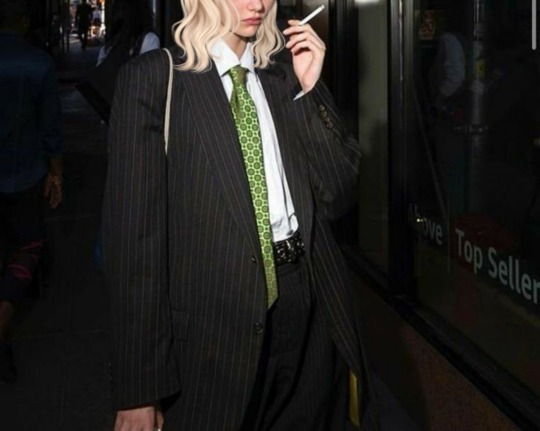

To touch back onto my understanding of the class dynamics at play within the Wayne family and how it reflects back on their personal style , I think there are five key-points to talk about– Upbringing, class, gender, race and generation.
Tim, Bruce, and Damian fall into a similar category, having been raised as wealthy boys in a racially homogeneous environment with privileged access to private education. Tim possesses a deeper awareness of his privileged worldview compared to Damian, who is more detached from poverty. Dick occupies a unique position due to his early adoption into the affluent world and his background as the son of performers, which cultivated his charm and adaptability. He seamlessly integrates into high society, drawing from his upbringing. Stephanie, Cassandra, Jason, and Duke, however, have experienced more time in lower-class environments than in financial stability, forming their own distinct circle. They share a mutual understanding rooted in shared experiences, vernacular accents, inside jokes, and nuanced awareness of class dynamics and microaggressions, which sometimes excludes the other group.


When Tim adopts a more casual, Gen-Z skater-boy persona outside of Wayne Enterprises' strict business casual environment, the second group sometimes call him a poser due to the African American roots of the skater style, which emerged in opposition to everything Tim represents– is. While they may be perceived as the "cool kids" within the house– and at school–, they are more protective of one another than malicious towards others, guarding their identity and personal struggles fiercely as an act of revendication.
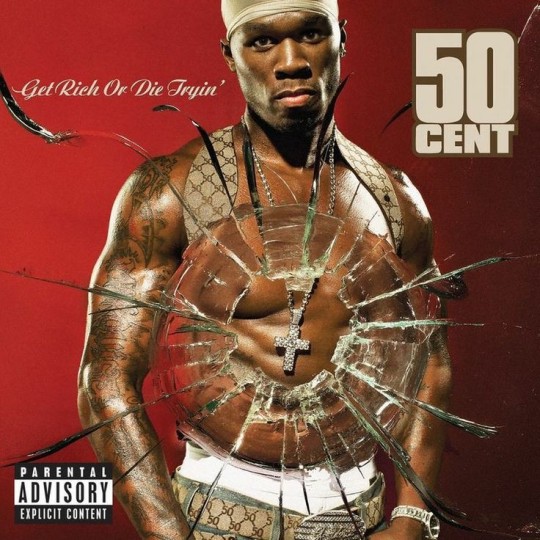
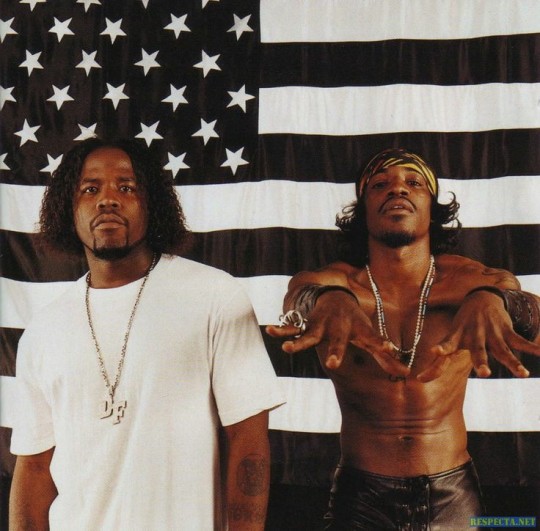
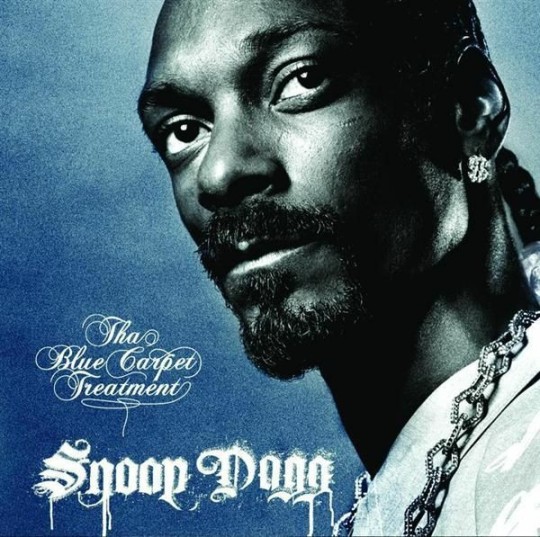
She mainly listens to 90's and early 2000's rap music and blasts "Poor Lil rich" by 50 cent whenever she has a fight with Bruce or Tim.
#kinda ooc but my version is better#Fuck canon#listen to me#stephanie brown#duke thomas#Steph and Duke are platonic soulmates#batman comics#batfam#jason todd#batman#signal#tim drake#dick grayson#damian wayne
130 notes
·
View notes
Text
the brutality and unfairness of formula 1

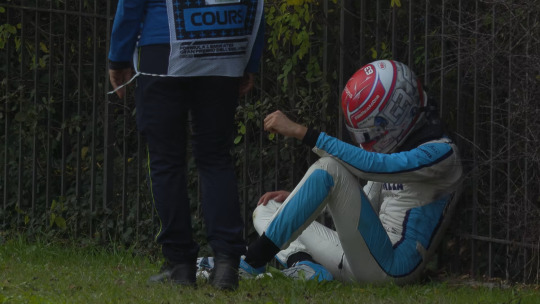
image source: f1
formula 1 is often hailed as the pinnacle of motorsport—a glamorous world filled with speed, technology, and the elites of racing. yet beneath the polished surface lies a brutal reality that often leaves drivers and teams at the mercy of ruthless decisions and the cold calculus of performance. with the controversies surrounding recent driver sackings and the ever-looming shadow of financial disparity, it's high time to examine why many argue that f1 is not a fair sport.
ruthless reality

image source: williams racing
just recently, valtteri bottas made headlines by bluntly stating that formula 1 is "not a fair sport." this sentiment resonates deeply with fans and insiders alike, especially in light of the way teams handle their drivers. for instance, williams' mid-season decision to replace logan sargeant has raised eyebrows and sparked heated debates. was it a ruthless move? or was it justified based on performance? the circumstances around logan's sacking were especially harsh, underlining the pressure to deliver results in a sport that doesn't tolerate anything below excellence.
these decisions are just business, but they reflect a culture where loyalty and patience often take a backseat to immediate results and instant gratification. a planetf1 analysis of f1 driver sackings reveals a history of brutal firings that underscore the cutthroat nature of the sport. one moment a driver is a team's new big thing, and the next they can find themselves out of a job—often with little explanation and even less sympathy.
money talks
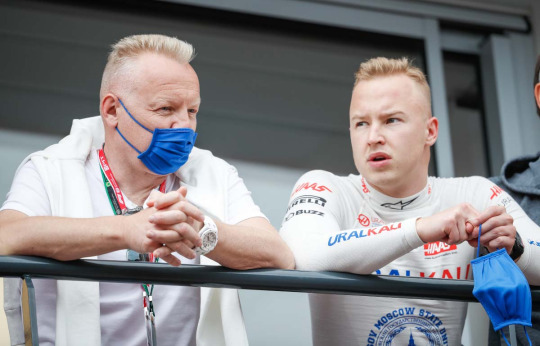
image source: planetf1
one of the most damning realities of formula 1 is the pervasive influence of money. while talent is certainly a necessity for success, it's increasingly clear that without financial backing, even the most skilled drivers can find their careers stymied. talent alone isn't enough—financial resources play a critical role in a driver's future on track.
the narrative is all too familiar: drivers from wealthy backgrounds secure seats, while those without such financial support are often left scrambling for alternatives. the talent pool is vast, but the pathways to success are often barricaded by financial constraints, leaving many deserving drivers in the dust.
pressure cooker environment

image source: f1
the intense pressure in f1 extends beyond just performance; it creates a hostile environment where mental health often takes a back seat. with every race being a high-stakes affair, the neverending pressure to perform can lead to a decline in mental health, resulting in public scrutiny and harsh critiques from fans and pundits alike.
this culture can be devastating, particularly for young drivers like sargeant, who may not yet have developed the thick skin required to withstand the scrutiny that comes with the job. in a sport where every mistake is magnified, the fear of failure looms large, creating a vicious cycle of anxiety and poor performance.
a system rigged against fair play

image source: valtteri bottas
as bottas pointed out, the very structure of f1 seems rigged. with teams prioritising sponsorship over pure driving skill, the sport can sometimes feel more like a corporate machine than a celebration of racing talent. the narrative that emerges is one where drivers are mere cogs in a vast, profit-driven engine—evaluated not just on their ability to race, but on their marketability and financial backing too.
this is a trend that not only alienates talented drivers, but also undermines the essence of competition. when financial clout trumps sheer talent, fans are left wondering if they are witnessing trye sporting excellence or merely a financial showcase.
a call for change

image source: reddit
the brutality and unfairness of formula 1 cannot be ignored. as we witness the rise and fall of drivers like logan sargeant and daniel ricciardo and hear the stark words of valtteri bottas, it's clear that something needs to change. the sport should be a true meritocracy, where talent is the primary determinant of success, rather than the size of a driver's bank account and mental health is valued and supported.
in a world that often glorifies the fast and the furious, it's time to take a step back and consider the humans behind the helmets. the brutal realities of f1 deserve a spotlight, not just for the sake of drivers like logan and daniel, but for the integrity of the sport as a whole. it's high time formula 1 balanced its fierce competitiveness with a sense of fairness, allowing true talent to shine without the heavy hand of financial disparity and mental turmoil looming overhead.

sources
woodhouse, jamie. "valtteri bottas delivers brutal f1 'not a fair sport' verdict after '10 per cent driver' claim." planetf1, 16 aug. 2024, www.planetf1.com/news/valterri-bottas-formula-1-not-a-fair-sport
beevi, zuhrah. "williams replacing logan sargeant mid-season: brutal or deserved?" medium, 28 aug. 2024, www.medium.com/formula-one-forever/williams-replacing-logan-sargeant-mid-season-brutal-or-deserved-b0bd57de94b9
mitchell-malm, scott. "the most damning part of william's ruthless f1 sacking." the race, 28 aug. 2024, www.the-race.com/formula-1/most-damning-part-williams-ruthless-sacking-logan-sargeant/
maher, thomas. "f1 driver sackings: the most brutal firings and bitter disputes in f1 history." planetf1, 17 july 2024, www.planetf1.com/features/brutal-f1-driver-sackings
"the cruel side of formula 1: talent not enough, without money there is no future on the track." scuderia fans, 8 sept. 2024, www.scuderiafans.com/the-cruel-side-of-formula-1-talent-not-enough-without-money-there-is-no-future-on-the-track/

if any errors or typos are noticed, PLS PLS point them out via comment, ask, or dm. if there is a specific topic you would like me to cover, send in an ask and i'll look into it!
#formula one#formula 1#f1#f1blr#logan sargeant#daniel ricciardo#formulaphoe: f1#formulaphoe: opinion
24 notes
·
View notes
Text
Tbh I don’t quite understand the sentiment that Engage doesn’t have good or any worldbuilding at all, like tf is up with that. First instinct would be “them 3H fans again!!!” but other long time FE fans also consider it lackluster and idk I don’t agree.
Each of the four nations all have surface level distinctions, but in-depth internal layers, such as...
Firene values peace, gratitude, and its harvests, tea, and medicine. It’s the kingdom that would usually be taken advantage of, but the reason it maintains its peace is through aggressive policy done by its leaders, currently by Eve and very notably followed up by Celine. Medicine and health is taken seriously cuz the last king died from an illness, the same illness which the current and well loved prince is suffering from. The Firene retainers are all nobles sans Louis, who is noted to have gotten his role because of his domestic skill in tandem with his martial prowess; this implies a sort of status quo, one that’s maintained to keep things peaceful, though not overly enforced to the point of oppression.
Brodia is wealthy and martially strong, yet prideful. The nobility is noted to take advantage of the constant wars on Elusia, as it fuels economy, which in turn fuels more wars. The wars against Elusia themselves are partly an extension of Brodia’s pride: aggressive expansion done in the name of “keeping a wicked nation in check” and to further Brodian way of life. Because strength is valued, the Brodian retainers are all common folk who proved themselves, sans Citrinne, who develops a complex about her strength because of it. Mining is the primary income source after warfare, something that Diamant wants to shift towards to the dismay of war benefitting nobles.
Elusia is the kingdom of knowledge, and as such, is the only nation noted to have a major place of education. The arts and the leisure seems to be highly valued here, due to an author, an artist, and a native to a hot spring centered village being recruited. Retainers, like in Brodia, are decided by strength or capability; after all, you don’t often have a Crown Princess’s servants be a former assassin and a former prince without skill and knowledge being paramount in the decision making. Hyacinth has too much love to go around, and so has a wife as well as many mistresses, and many children as a result. Knowledge begets avenues of possibility, which means one can use said knowledge to selfishly get ahead (such as the Elusian court where backstabbing and fake platitudes to appeal to the King and Queen were common place) or to benefit the world around you (Hortensia using her intellect and talent to help war victims, and Ivy utilizing Elusia’s creativity and innovative practices to better the public’s wellbeing). Seeking knowledge, however, can entrench one in dark practices, which is why the worship of the Fell Dragon went from notable to beligerent and dangerous.
Solm values freedom, and is notable for being a strict matriarchy. Only women take the throne, Merrin’s village is only ran by women, and Panette and Pandreo’s family church was headed by their mother. While open minded and easy going on the surface, Solm having its own elite vigilante group and having spies throughout the continent means that the queendom takes measures to ensure freedom very seriously; these actions are similar to Firene, which is brought up in Celine and Fogado’s support, and the two themselves are indicative of each of their nations cultures. Unlike the other nations, there’s no strict basis for who becomes a retainer, since you have a chef, a priest, and two runaways. The people of Solm live their lives how they want, and its culture is more open to entertainment and large gatherings than other nations.
And this is just what I whipped together from memory. I’ve no doubt that there’s tons of other minute details that, when pieced together, form more descriptions of the nations as a whole. This, to me, is on part with how the GBA games and Echoes built their worlds. Very solid in depth readings, with surface level broad strokes to entice the player in should they choose to put more hours into learning the ins and outs. And that isn’t even getting into the artistic directions of each nation and the characters (like outfits, seasonal representations, food/ingredients, etc.). Hell, the entirety of Elyos is shaped like a ring for crying out loud! It’s screaming “yeah the rings are this central to this world, enjoy your stay.”
I like that. Engage knows what it is and what it wants to present. No more, no less.
204 notes
·
View notes
Text
The Sacklers woulda gotten away with it if it wasn't for those darned meddling feds
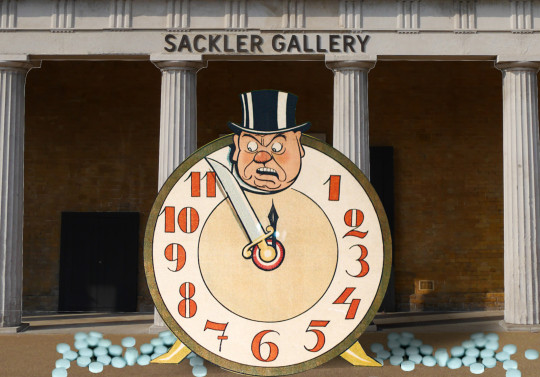
The saga of the Sacklers, a multigenerational billionaire crime family of mass-murdering dope-peddlers, is an enraging parable about how the wealthy, the courts, and sadistic high-powered lawyers collude to destroy the lives of millions, profit handsomely, and evade justice.
But there's an unexpected twist to this tale. After the Sacklers procured a sham bankruptcy that denied their victims the right to sue while leaving their fortune largely intact, the Supreme Court – yes, this Supreme Court – saw through the scam and froze the process, pending a full hearing:
https://www.nytimes.com/2023/08/10/us/supreme-court-purdue-pharma-opioid-settlement.html
The Sacklers basically invented modern, legal dope peddling. Arthur Sackler, the family's original crime-boss, revived the practice of direct-to-consumer drug marketing, dormant since the death of the medicine show, to peddle Valium. An aggressive and shrewd lobbyist, Arthur built the family fortune and, more importantly, its connections:
https://www.timesofisrael.com/how-the-sackler-family-built-a-pharma-dynasty-and-fueled-an-american-calamity/
A generation later, the family's business company created Oxycontin, and procured misleading and false research about the drug's safety kickstarting the opioid epidemic, whose American body-count is closing in on a million dead. Armed with inflated claims about opioid safety, the Sacklers' pharma reps bribed, cajoled and tricked doctors into writing millions of prescriptions for oxy.
This scam had a natural best-before date. As ODs flooded America's ERs and bodies piled up in America's morgues, it became increasingly clear that something was rotten. The Sacklers pursued a multipronged campaign to keep the truth from coming to light, and to keep the billions flowing.
On the one hand, they hired McKinsey to find novel ways to encourage doctors to keep writing prescriptions and to convince pharmacists to turn a blind eye to abuse. McKinsey had all kinds of great ideas here, including paying pharma distributors cash bonuses for every overdose death in their territory:
https://www.nytimes.com/2021/02/03/business/mckinsey-opioids-settlement.html
When the issue of these deaths came up in public, the Sacklers blamed "criminal addicts" for their own misery, stigmatizing both people who desperately needed pain relief and the people who'd been deliberately hooked on the Sacklers' products. The legacy of this smear campaign is still with us, both in the contempt for people struggling with addiction and in the cruel barriers placed between people in unbearable agony and medical relief.
But mostly, the Sacklers kept their names out of it. They laundered their reputations by donating a homeopathic fraction of their vast drug fortune to art galleries and museums in a bid to make their names synonymous with good deeds.
The Sacklers didn't invent this trick. Think of the way that history's great monsters – Carnegie, Mellon, Rockefeller, Ford – are remembered today for the foundations and charities that bear their names, not for the untold misery they inflicted on their workers, their crimes against their customers, and the corruption of governments.
But the Sacklers made those Gilded Age barons seem like amateurs. They invented a modern elite philanthropy playbook that Anand Giridharadas documents in his must-read Winners Take All, about the charity-industrial complex that washes away an ocean of blood with a trickle of money:
https://memex.craphound.com/2018/11/10/winners-take-all-modern-philanthropy-means-that-giving-some-away-is-more-important-than-how-you-got-it/
As part of this PR exercise, the individual Sacklers kept their names and images out of the public eye. For years, there were virtually no news-service photos of individual Sacklers. When journalists dared to criticize the family, they used vicious attack-lawyers to intimidate them into retractions and silence (I was threatened by the Sacklers' lawyers).
They also worked their media mogul pals, like Mike Bloomberg, who added their names to the "Friends of Mike" list that Bloomberg reporters were required to consult before writing negative coverage:
https://pluralistic.net/2020/02/29/friends-of-mike-enemies-of-the-people/#sacklerbergs
But Stein's Law says that "anything that can't go on forever will eventually stop." As lawsuits mounted, the Sacklers found themselves increasingly synonymous with death, not charitable works. But like any canny criminal, the Sacklers had a getaway plan.
First, they extracted vast sums from Purdue and shifted it into offshore financial secrecy havens:
https://www.reuters.com/article/us-purduepharma-bankruptcy/sacklers-reaped-up-to-13-billion-from-oxycontin-maker-u-s-states-say-idUSKBN1WJ19V
Even as this money was disappearing into legal black holes, the Sacklers demanded – and received – extraordinary protection from the courts, who aggressively sealed testimony and materials presented through discovery:
https://www.reuters.com/investigates/special-report/usa-courts-secrecy-judges/
When this gambit finally failed, the Sacklers insisted that were down to their last $4 billion, and, with trillions in claims pending against them, they declared bankruptcy.
When a normal person declares bankruptcy, they are required to divest themselves of nearly everything of value they possess, and then still find themselves hounded by cruel arm-breakers who deluge them with threatening calls and letters:
https://pluralistic.net/2021/05/19/zombie-debt/#damnation
But for the richest people in America, bankruptcy is merely a way to cleanse one's balance sheet of liabilities for any atrocity you may have committed on the way, without giving up your fortune.
The Sacklers are a case-study in how a corrupt bankruptcy can be conducted.
Purdue Pharma presents a maddening case-study in the corrupt benefits of bankruptcy. When it was announced in March, many were outraged to learn that the Sacklers were going to walk away with billions, while their victims got stiffed.
First, they converted their victims' right to compensation into "property" that the Sacklers themselves owned. This transferred jurisdiction over these claims from the regular court system to the bankruptcy court. A bankruptcy judge – not a jury – would decide how much each of these claims was worth, and then what how much of that worth these victims (now recast as creditors) would be entitled to through the bankruptcy.
Thus tens of thousands of claims were nonconsensually settled without a trial, by an administrative judge with no criminal jurisdiction, not a federal judge who'd undergone Senate confirmation:
https://pluralistic.net/2021/03/31/vaccine-for-the-global-south/#claims-extinguished
These "coercive restructuring techniques" are not available to everyday people who are drowning in student debt or credit-card bills – these are the exclusive purview of the wealthiest Americans, who enjoy a completely different bankruptcy system that is rigged in their favor.
Three judges – David Jones and Marvin Isgur of Houston and Bob Drain of New York – hear 96% of the country's large corporate bankruptcies:
https://www.creditslips.org/creditslips/2021/05/judge-shopping-in-bankruptcy.html
These judges are unbelievably horny for corporations, embracing a legal theory "that casts the invention of the limited liability corporation alongside that of the steam engine as a paradigmatic development in the pursuit of prosperity":
https://prospect.org/justice/how-do-you-solve-a-problem-like-the-sacklers-purdue-pharma-bankruptcy/
Now there are more than three bankruptcy judges in America, so how do the nation's biggest companies get their cases heard by these three enthusiastic Renfields for corporate vampirism?
They cheat.
For example: when GM was facing bankruptcy, it argued that it was a New York company on the basis that it owned a single Chevy dealership in Harlem, and got in front of Judge Drain.
The Sacklers were – characteristically – even more brazen. They really wanted to get their case in front of Judge Drain, the nation's most enthusiastic supporter of "third party releases," through which bankrupt billionaires can wipe the slate clean, securing dismissals of all claims by the people they wronged.
Drain is also uniquely hostile to independent examiners, "an independent third-party appointed by the court to investigate 'fraud, dishonesty, incompetence, misconduct, mismanagement, or irregularity…by current or former management of the debtor."
https://papers.ssrn.com/sol3/papers.cfm?abstract_id=3851339
If you're the Sacklers, hoping to keep two thirds of your billions and extinguish all claims by your victims, there is no better helpmeet than Judge Robert Drain of the Southern District of New York.
So, 192 days before filing for bankruptcy, the Sacklers opened an office in White Plains, New York (a company may claim jurisdiction in a specific court once they've operated a business there for 180 days).
Then they filed a bankruptcy in which they altered the metadata on their casefile, inserting the code for a Westchester county hearing into the machine-readable, human-invisible parts of the documents they uploaded to the federal Case Management/Electronic Case Files (CM/ECF) system (they also captioned the case with "RDD, for "Robert D Drain").
They chose their judge, and the judge obliged. UCLA Law's Lynn LoPucki is one of the leading scholars of these bankruptcy "megacases," and has written extensively on why these three judges are so deferential to corporate criminals seeking to flense themselves of culpability. She sees judges like Drain motivated by "personal aggrandizement and celebrity and ability to indirectly channel to the local bankruptcy bar. The judge is the star and the ringmaster of a megacase – very appealing to certain personalities."
Thus, these judges are "willing and eager to cater to debtors to attract business…[an] assurance to debtors that…these judges will not transfer out cases with improper venue or rule against the debtor…"
https://www.fulcrum.org/concern/monographs/02870w66d
This kind of judge-shopping goes beyond the Sacklers; the cases that Drain and co preside over make a mockery of the idea of America as a land of equal justice. "Prepack" and "drive-through" bankruptcies are reliable get-out-of-jail-free cards for capitalism's worst monsters: private equity firms.
Whether PE murdered your grandmother by buying her care-home and putting each worker in charge of 30 seniors:
https://www.washingtonpost.com/local/portopiccolo-nursing-homes-maryland/2020/12/21/a1ffb2a6-292b-11eb-9b14-ad872157ebc9_story.html
or poisoned your kids by filling your neighborhood with carcinogens:
https://www.webmd.com/special-reports/ethylene-oxide/20190719/residents-unaware-of-cancer-causing-toxin-in-air
limited liability wipes the slate clean.
30% of America's bankruptcies are private equity companies using the bankruptcy system to wipe away claims for their misdeeds, while keeping a fortune, thanks to the shield of limited liability.
Take Millennium Health, JamesS lattery's fake drug-testing company, which promised to help nursing homes figure out whether seniors were abusing (or selling) their meds by testing their piss for angel dust and other drugs. Slattery defrauded Medicare and Medicaid for millions, borrowed $1.8 billion (Slattery got $1.3 billion of that). He eventually walked away from this fraud after paying a mere $256m to settle all claims, and kept a fortune in assets, including the 40 vintage planes his private company ("Pissed Away LLC" – I am not making this up) owned:
https://prospect.org/justice/how-do-you-solve-a-problem-like-the-sacklers-purdue-pharma-bankruptcy/
For the wealthy, bankruptcy is the sport of kings, a way to skip out on consequences. For the poor, bankruptcy is an anchor – or a noose. This is by design: judges who preside over elite bankruptcies speak of their protagonists as heroic "risk takers" and tiptoe around any consequences, lest these titans be chained to a mortal's fate, costing us all the benefits of their entrepreneurial genius.
PE companies helped the Sacklers design their own bankruptcy strategy, and it was a standout, even by the standards of Bob Drain and his kangaroo bankruptcy court. But now, the Supreme Court has pumped the brakes on the whole enterprise.
The judges ruled that the exceptions the Sacklers took advantage of were intended for bankrupts in "financial distress" – not billionaires with vast fortunes hidden overseas. In so doing, the court threatens all manner of corrupt arrangements, from "the Boy Scouts, wildfires and allegations of sexual abuse in the church diocese — where third parties get a benefit from a bankruptcy they themselves aren’t going through.”
The case was brought by the DoJ's US Trustee Program, which lost in the Second Circuit when it tried to halt the Purdue bankruptcy and argued that the Sacklers themselves had to declare bankruptcy to discharge the claims against them.
Now the Supremes have hit pause on the bankruptcy the Second Circuit approved, and will hear the case themselves. It's only one step on a long road, but it's an unprecedented one. Some of the country's filthiest fortunes are riding on the outcome.

Going to Defcon this weekend? I’m giving a keynote, “An Audacious Plan to Halt the Internet’s Enshittification and Throw it Into Reverse,” tomorrow (Aug 12) at 12:30pm, followed by a book signing at the No Starch Press booth at 2:30pm!
https://info.defcon.org/event/?id=50826


I’m kickstarting the audiobook for “The Internet Con: How To Seize the Means of Computation,” a Big Tech disassembly manual to disenshittify the web and bring back the old, good internet. It’s a DRM-free book, which means Audible won’t carry it, so this crowdfunder is essential. Back now to get the audio, Verso hardcover and ebook:
http://seizethemeansofcomputation.org

If you'd like an essay-formatted version of this thread to read or share, here's a link to it on pluralistic.net, my surveillance-free, ad-free, tracker-free blog:
https://pluralistic.net/2023/08/11/justice-delayed/#justice-redeemed

Image: Edwardx (modified) https://commons.wikimedia.org/wiki/File:Serpentine_Sackler_Gallery,_June_2016_05.jpg
CC BY-SA 4.0 https://creativecommons.org/licenses/by-sa/4.0/deed.en
#scotus#us trustee program#drive-through bankruptcy#coercive restructuring techniques#blood money#opioids#opioid epidemic#oxycontin#purdue pharma#elite philanthropy#reputation laundering#elite impunity#sacklers#judge drain#sdny#bankruptcy#bankruptcy shopping#friends of mike#pluralistic#debt#mckinsey
171 notes
·
View notes
Text
Contrary to far-right fantasies like QAnon, this campaign by the elites was no conspiracy. It took place right out in the open, starting with politicians like Ronald Reagan and Margaret Thatcher and running right through the present day. “The Davos elite aren’t eating our children,” Naomi Klein writes in her new book, “but they are eating our children’s futures, and that is plenty bad.”
To hide their undeserved gains, some of the wealthy downplay the helping hands they have received, whether from family (Donald Trump’s referring to $60.7 million as “a small loan from my father”) or the government (Tesla and SpaceX CEO Elon Musk’s criticizing government subsidies even though his companies have received billions from the government).
Mostly, though, they and their political servants (in the U.S., that means especially, but not exclusively, the Republican Party) stoke fights on battlefields small and large. Gurner blames young people’s monetary struggles on avocado toast and overpriced coffee. Major Republican donors like Rebekah Mercer donate millions to conservative media outlets and candidates who stoke fears of culture wars, drag queens and people of color — and who, when they get into office, prioritize tax cuts slanted toward the wealthy.
And some are more brazen. Klein quotes the mid-20th century Belgian leftist Abram Leon’s observation about the Nazis’ use of antisemitic conspiracy theories: “Big business endeavored to divert and control the anti-capitalist hatred of the masses for its exclusive profit.” If that sounds like an extreme comparison, remember that of all the organizations and people who have criticized Musk’s ownership of X (formerly Twitter), he is blaming the collapse in the company’s value on the Anti-Defamation League.
125 notes
·
View notes